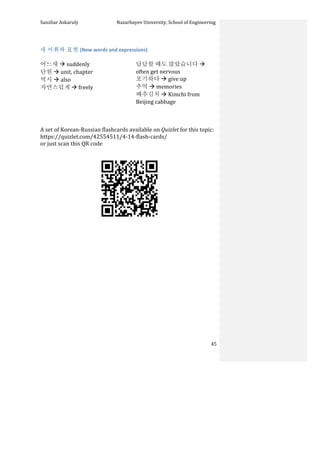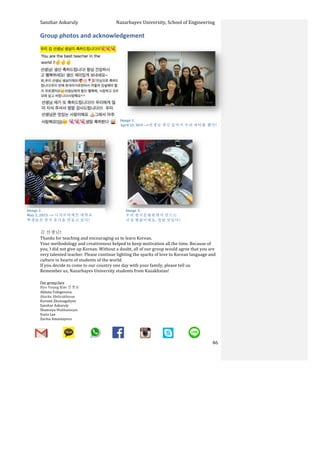The document is a set of notes adapted from the King Sejong Institute's Korean language book, containing various dialogs, vocabulary, and grammar rules for learners. It covers multiple topics such as daily life, cultural differences, food, and volunteering, along with dialogues illustrating the usage of new expressions. Prepared by Sanzhar Askaruly in 2015 at Nazarbayev University, the notes are structured into chapters with corresponding vocabulary and grammar explanations.
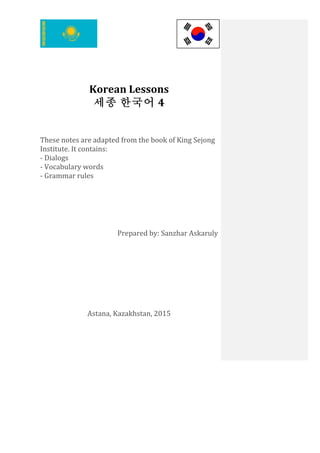
![Sanzhar
Askaruly
Nazarbayev
University,
School
of
Engineering
2
Table
of
contents:
01.
근황
[Situation]
.............................................................................................................
4
대화
1
(Dialog)
...............................................................................................................................
4
대화
2
(Dialog)
...............................................................................................................................
5
새
어휘와
표현
(New
words
and
expressions)
...................................................................
6
02.
외국
생활
[Life
abroad]
..............................................................................................
7
대화
1
(Dialog)
...............................................................................................................................
7
대화
2
(Dialog)
...............................................................................................................................
8
새
어휘와
표현
(New
words
and
expressions)
...................................................................
9
03.
초대
[Invitation]
........................................................................................................
10
대화
1
(Dialog)
............................................................................................................................
10
대화
2
(Dialog)
............................................................................................................................
11
새
어휘와
표현
(New
words
and
expressions)
................................................................
12
04.
결심
[Determination]
...............................................................................................
13
대화
1
(Dialog)
............................................................................................................................
13
대화
2
(Dialog)
............................................................................................................................
14
새
어휘와
표현
(New
words
and
expressions)
................................................................
15
05.
문화
차이
[Cultural
difference]
.............................................................................
16
대화
1
(Dialog)
............................................................................................................................
16
대화
2
(Dialog)
............................................................................................................................
17
새
어휘와
표현
(New
words
and
expressions)
................................................................
18
06.
감서
[Gratitude]
.........................................................................................................
19
대화
1
(Dialog)
............................................................................................................................
19
대화
2
(Dialog)
............................................................................................................................
20
새
어휘와
표현
(New
words
and
expressions)
................................................................
21
07.
공공시설
[Public
facility]
........................................................................................
22
대화
1
(Dialog)
............................................................................................................................
22
대화
2
(Dialog)
............................................................................................................................
23
새
어휘와
표현
(New
words
and
expressions)
................................................................
24
08.
예약
[Reservation]
....................................................................................................
25
대화
1
(Dialog)
............................................................................................................................
25
대화
2
(Dialog)
............................................................................................................................
26
새
어휘와
표현
(New
words
and
expressions)
................................................................
27
09.
경험
[Experience]
......................................................................................................
28
대화
1
(Dialog)
............................................................................................................................
28
대화
2
(Dialog)
............................................................................................................................
29
새
어휘와
표현
(New
words
and
expressions):
...............................................................
30
10.
요리
[Food]
..................................................................................................................
31
대화
1
(Dialog)
............................................................................................................................
31
대화
2
(Dialog)
............................................................................................................................
32](https://image.slidesharecdn.com/koreanlessons4-220313144001/85/Korean-Lessons-4-2-320.jpg)
![Sanzhar
Askaruly
Nazarbayev
University,
School
of
Engineering
3
새
어휘와
표현
(New
words
and
expressions)
................................................................
33
11.
영화와
드라마
[Movie&Drama]
............................................................................
34
대화
1
(Dialog)
............................................................................................................................
34
대화
2
(Dialog)
............................................................................................................................
35
새
어휘와
표현
(New
words
and
expressions)
................................................................
36
12.
패션
[Fashion]
............................................................................................................
37
대화
1
(Dialog)
............................................................................................................................
37
대화
2
(Dialog)
............................................................................................................................
38
새
어휘와
표현
(New
words
and
expressions)
................................................................
39
13.
성격
[Personality]
.....................................................................................................
40
대화
1
(Dialog)
............................................................................................................................
40
대화
2
(Dialog)
............................................................................................................................
41
새
어휘와
표현
(New
words
and
expressions)
................................................................
42
14.
소감
[Opinion]
............................................................................................................
43
대화
1
(Dialog)
............................................................................................................................
43
대화
2
(Dialog)
............................................................................................................................
44
새
어휘와
표현
(New
words
and
expressions)
................................................................
45
Group
photos
and
acknowledgement
........................................................................
46](https://image.slidesharecdn.com/koreanlessons4-220313144001/85/Korean-Lessons-4-3-320.jpg)
![Sanzhar
Askaruly
Nazarbayev
University,
School
of
Engineering
4
01.
근황
[Situation]
대화
1
(Dialog)
수진:
요즘
어떻게
지내세요?
치엔:
정신없이
지내고
있어요.
회사에서
일이
많아서
사무실에서
식사를
하면서
일할
때도
많아요.
수진씨는요?
구진:
저는
늘
똑같지요.
재미업고
심심해요.
치엔:
그래요?
그럼
봉사
활동을
해
보면
어때요?
저는
요즘
주말에
회사
근처에
있는
고아 a 원에서
아이들을
돌보고
있어요.
같이
하는
사람들과도
친구가
돼서
주말이
즐거워요.
구진:
그래요?
저도
한본
시작해
볼까요?
치엔:
그래요.
제가
같이
봉사
활동을
하는
친구들도
많이
소개해
줄게요.
어휘와
표현
(Vocabulary):
근황
à
Situation
(공부/취직
준비)는
잘
돼요?
à
How
is
study/employment
prep
going?
네,
그럭저럭요.
à
Yes,
so-‐so.
요즘
어떻게
지내요?
à
How
are
you
these
days?
요즘
신나요.
à
I
am
excited
these
days
특별한
일
없어요?
à
Nothing
special
happened?
정신없이
지내고
있어요.
à
Extremely
busy
별일
없어요.
à
Nothing
special
늘
똑같지요,
뭐.
à
It
is
the
same
as
before.
지루해요.
à
Boring
심심해요.
à
Bored
문
법
(Grammar):
-‐
(으)면서
à
doing
things
at
the
same
time
(simultaneously)
1)
가:
뭐
해요?
나:
친구를
기다리면서
책을
읽고
있어요.
2)
저는
직장을
다니면서
대학원도
다녀요.
3)
치엔
씨는
뉴스를
보면소
아침을
목어요.
Sanzhar Askaruly 2/2/15 11:41 PM
Comment [1]: Very busy
Sanzhar Askaruly 2/2/15 11:43 PM
Comment [2]: There
is
a
lot
of
job,
that
is
why
I
eat
and
work
in
the
office
Sanzhar Askaruly 2/2/15 11:44 PM
Comment [3]: Always
the
same
Sanzhar Askaruly 2/2/15 11:45 PM
Comment [4]: Boring
and
not
interesting
Sanzhar Askaruly 2/2/15 11:47 PM
Comment [5]: Volunteering
service
Sanzhar Askaruly 2/2/15 11:48 PM
Comment [6]: Was
looking
after
baby
in
the
orphanage
Sanzhar Askaruly 2/2/15 11:50 PM
Comment [7]: Make
friends
and
spend
weekends
happily
Sanzhar Askaruly 2/2/15 11:51 PM
Comment [8]: Introduce
to
many
friends
Sanzhar Askaruly 2/3/15 12:23 AM
Comment [9]: Read
a
book
while
waiting
for
a
friend
Sanzhar Askaruly 2/3/15 12:22 AM
Comment [10]: I
was
working
as
well
as
studying
graduate
school
at
the
same
time
Sanzhar Askaruly 2/3/15 12:23 AM
Comment [11]: Watch
news
and
have
a
breakfast
at
the
same
time](https://image.slidesharecdn.com/koreanlessons4-220313144001/85/Korean-Lessons-4-4-320.jpg)
![Sanzhar
Askaruly
Nazarbayev
University,
School
of
Engineering
5
대화
2
(Dialog)
수진:
요즘은
어때요?
이번
주도
바쁘게
보냈어요?
치엔:
네.
그런데
수진
씨,
지난본에
이야기한
봉사
활동
생각해
봤어요?
저는
이본
주에
친구하고
같이
가려고
해요.
같이
갈래요?
수진:
네.
그럴가요?
치엔:
잘
생각했어요.
참,
봉서
활동을
가면
정우
씨도
만날수
있을
거예요.
수진:
어,
정말요?
종우
씨는
요즘
어떻게
지내요?
치엔:
성실하게
회사에
다니고
봉사
활동도
열심히
하고
있어요.
어휘와
표현
(Vocabulary):
인물
묘사
à
Character
description
성실하다
à
Sincere
불성실하다
à
Not
sincere
착하다
à
Kind
믿음직하다
à
Reliable
똑똑하다
à
Smart
책임감
있다
à
Responsible
부지런하다
à
Diligent
게으르다
à
Lazy
문
법
(Grammar):
-‐게
à
suffix
that
converts
adjective
into
adverb
1)
가:
지난주에
새로
온
직원은
어때요?
일
잘해요?
나:
네,
일도
부지런하게
잘하고
성격도
좋아요.
2)
친절하게
설면해
주셔서
감사합니다.
3)
글씨가
잘
안
보이니까
좀
크게써
주세요.
Sanzhar Askaruly 2/3/15 12:51 AM
Comment [12]: Are you busy this week?
Sanzhar Askaruly 2/3/15 12:55 AM
Comment [13]: Did
you
decide
to
go
volunteering
that
we
spoke
last
time?
Sanzhar Askaruly 2/3/15 12:58 AM
Comment [14]: In
fact,
we
will
meet
Mr.
Chung
Woo
there
Sanzhar Askaruly 2/3/15 12:58 AM
Comment [15]: Oh,
really,
how
is
he
going
these
days?
Sanzhar Askaruly 2/3/15 1:00 AM
Comment [16]: He
sincerely
attends
work
and
diligently
helps
volunteering.
Sanzhar Askaruly 2/3/15 1:19 AM
Comment [17]: How is the new employee
who came last week?
Sanzhar Askaruly 2/3/15 1:30 AM
Comment [18]: He
diligently
works
and
the
character
is
nice.
Sanzhar Askaruly 2/3/15 1:30 AM
Comment [19]: Thank
you
for
friendly
explaining.
Sanzhar Askaruly 2/3/15 1:30 AM
Comment [20]: Your
handwriting
is
not
seen
well,
so
please
write
a
bit
bigger.](https://image.slidesharecdn.com/koreanlessons4-220313144001/85/Korean-Lessons-4-5-320.jpg)
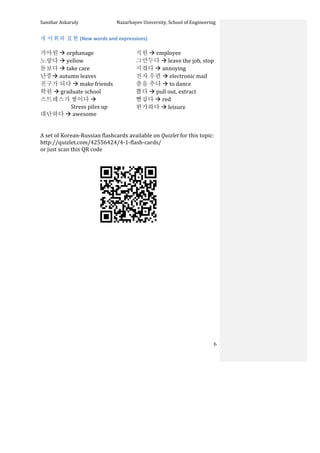
![Sanzhar
Askaruly
Nazarbayev
University,
School
of
Engineering
7
02.
외국
생활
[Life
abroad]
대화
1
(Dialog)
투이:
정우
씨는
베트남에
온
지
얼마나
됬어요?
정우:
작년에
왔으니까,
음,
일
년
육
개월
정도
되었어요.
투이:
벌써
그렇게
됬어요?
시간
참
빠르네요.
제가
정우
씨를
처음
본
것이
엊그제
같은데……
정우:
맞아요.
처음에는
여기
생활에
익숙하지
않아서
실수를
참
많이
했었지요.
보스를
반대로
타기도
하고
길을
잃어버리기도
했어요.
투이:
저도
기억나요.
그래도
지금은
이곳
생활에
완전히
적응했지요?
정우:
아니에요.
아직도
잘
모르는
게
많아요.
어휘와
표현
(Vocabulary):
외국
생활
à
Life
abroad
외국에서
생활하다
à
Live
abroad
외국에서
근무하다
à
Work
abroad
외국계
회사에
취직하다
à
Get
employed
for
a
foreign
country
어학
연수를
가다
à
Go
abroad
to
study
language
외국
대학에
입학하다
à
Enroll
in
a
foreign
university
이민을
가다
à
Immigrate
고향으로
돌아가다
à
Return
to
the
hometown
귀국하다
à
Come
back,
return
문
법
(Grammar):
-‐(으)ㄴ
지
[되다,
지나다,
흐르다,
넘다]à
…
past
since
…
1)
가:
서울에
산지
얼마나
되었어요?
나:
오
년
됐어요.
오래
되었지요?
2)
요즘
너무
바빠서
진구들을
못
만난
지
두
달쯤
되었어요.
3)
이
책은
읽은
지
일
년도
넘었는데
아직도
내용이
거의
다
기억나요.
Sanzhar Askaruly 4/22/15 6:57 PM
Comment [21]: How long since you came
to Vietnam?
Sanzhar Askaruly 4/22/15 6:57 PM
Comment [22]: It
has
been
approximately
one
and
half
year
since
I
came
last
year.
Sanzhar Askaruly 4/22/15 6:57 PM
Comment [23]: Already
so?
Time
really
fast.
It
seems
as
that
I
have
seen
Chung
Woo
the
day
before
Sanzhar Askaruly 4/22/15 6:57 PM
Comment [24]: In
the
beginning
when
local
life
was
unfamiliar,
there
were
lots
of
mistakes
Sanzhar Askaruly 4/22/15 6:57 PM
Comment [25]: I
was
standing
at
the
opposite
of
bus
stop
and
got
lost
Sanzhar Askaruly 4/22/15 6:57 PM
Comment [26]: I
also
remember.
But
now
did
you
completely
get
used
to
this
life?
Sanzhar Askaruly 4/22/15 6:57 PM
Comment [27]: No,
there
are
still
thinks
that
I
do
now
know
well.
Sanzhar Askaruly 4/22/15 6:57 PM
Comment [28]: 살다 – How long have u
been living?
- 5 years. Is it long past?
Sanzhar Askaruly 4/22/15 6:57 PM
Comment [29]: Five
years
past.
Is
it
long?
Sanzhar Askaruly 4/22/15 6:57 PM
Comment [30]: It
has
been
approximately
two
months
since
I
cannot
meet
my
friends
because
I
am
busy
recently
Sanzhar Askaruly 4/22/15 6:57 PM
Comment [31]: Even though it has been a
year since I read the book, I can still remember
almost all of it.](https://image.slidesharecdn.com/koreanlessons4-220313144001/85/Korean-Lessons-4-7-320.jpg)
![Sanzhar
Askaruly
Nazarbayev
University,
School
of
Engineering
8
대화
2
(Dialog)
미라:
마크씨는
한국
사람보다
한국
음식을
더
조하하는것
가타요.
마크:
한국
사람보다요?
하하
그
정도는
아니에요.
처음에는
입에
안
맞는
음식도
좀
있었지만
지금은
다
잘
먹게
되었어요.
미라:
한국
음식도
잘
드시고
마크씨닌
한국
생활에
적응을
잘하는
곳
같아요.
어때요?
이제는
어려운
문제가
없지요?
마크:
음,
크게
어려운
문제는
없어요.
아!
한국을
떠나기
싫은
것이
문제네요.
어휘와
표현
(Vocabulary):
생활과
느낌
à
life
&
emotions
적은하다
à
adapt
익숙해지다
à
get
used
to
낯솔다
à
unfamiliar
잘
지내다
à
spend
time
well
이해하다
à
understand
즐기다
à
enjoy,
get
involved
긴장하다
à
worry,
be
ready
불편하다
à
uncomfortable
문
법
(Grammar):
-‐게
되다
à
started
to
do
smth,
had
to
do
that
1)
가:
치엔씨,
이번
주말에
고향에
가지요?
나:
아니요.
갑자기
일이
생겨소
멋
가게
되었어요.
2)
전에는
중국어를
못했지만
지금은
잘하게
되었습니다.
3)
처음에는
매운
음식이
싫었지만
이제는
아주
좋하하게
되었어요.
Sanzhar Askaruly 4/22/15 6:57 PM
Comment [32]: Seem
to
like
food
as
if
you
were
Korean
Sanzhar Askaruly 4/22/15 6:57 PM
Comment [33]: Ha-‐ha,
not
to
that
extent.
In
the
beginning,
I
didn’t
like
the
taste
a
bit,
but
now
I
started
to
eat
everything
well.
Sanzhar Askaruly 4/22/15 6:57 PM
Comment [34]: Ma
Kee,
you
eat
Korean
food
well
and
you
are
probably
adapted
to
Korean
life.
Is
it?
And
now,
do
you
have
difficult
problems?
Sanzhar Askaruly 4/22/15 6:57 PM
Comment [35]: I
do
not
want
to
leave
Korea
with
problems.
Sanzhar Askaruly 4/22/15 6:57 PM
Comment [36]: Do
you
go
to
homeland
this
weekens?
Sanzhar Askaruly 4/22/15 6:57 PM
Comment [37]: No,
suddenly
work
blossomed,
hence
I
must
not
go.
Sanzhar Askaruly 4/22/15 6:57 PM
Comment [38]: Lately,
I
could
not
do
Chinese
well,
but
now
I
started
to
speak
well.
Sanzhar Askaruly 4/22/15 6:57 PM
Comment [39]: In
the
beginning,
I
did
not
like
spicy
food
but
now
I
started
to
really
love
it.](https://image.slidesharecdn.com/koreanlessons4-220313144001/85/Korean-Lessons-4-8-320.jpg)
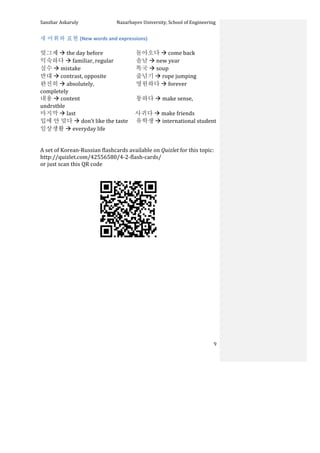
![Sanzhar
Askaruly
Nazarbayev
University,
School
of
Engineering
10
03.
초대
[Invitation]
대화
1
(Dialog)
미라:
마크
씨,
이번
제
생일에는
집에서
파티를
할까
해요.
파티에
오실
거지요?
마크:
집에서요?
좋은
생각이지만
파티
음식을
준비하려면
힘들
거예요.
미라:
네.
저도
그게
가장
걱정이었어요.
그런데
고향에
계신
어머니께서
한국
음식을
많이
보내
주셨어요.
그래서
이번에는
친구들을
집으로
초대해서
식사를
함께
할까
해요.
마크:
그럼,
집에서
해도
되겠네요.
벌써부터
기대돼요.
준비할
때
도움이
필요하면
연락하세요.
미라:
네.
고마워요.
그럴게요.
어휘와
표현
(Vocabulary):
초대à
Invitation
초대하다
à
Invite
부르다
à
Call
smbd.,
ex.
“Hey,
마크
씨”
초대를
받다
à
Receive
invitation
방문하다
à
Visit
모임을
가지다
à
To
have
a
gathering,
meeting
파티를
하다/열다à
To
have/hold
a
party
식시를
함께
하다à
To
have
a
meal
together
음식울
대접하다
à
Treat
food
to
smbd.
문
법
(Grammar):
-‐
(으)ㄹ까
하다
à
intend
to
do,
plan
to
do…
Ex:
I
plan
to
sell
books
1)
가:
투이
씨,
이번
주말에
뭐
할거예요?
나:
글쎄요.
특별한
일이
없으면
친구들을
집으로
초대할까
해요.
2)
퇴근하고
회사
동료들과
같이
저녁을
먹을까
해요.
3)
이사
가기
전에
잘
사용하지
않는
물건들을
중고로
팔까
해요.
Sanzhar Askaruly 4/22/15 6:58 PM
Comment [40]: This
time
I
am
doing
holding
birthday
party
at
home.
Re
you
coming?
Sanzhar Askaruly 4/22/15 6:58 PM
Comment [41]: At
home?
I
think
the
idea
is
good
but
it
will
be
difficult
to
prepare
food
for
party.
Sanzhar Askaruly 4/22/15 6:58 PM
Comment [42]: I
also
think
this
is
the
most
serious
worry.
But
my
mother
who
lives
in
hometown
sent
a
lot
of
Korean
food.
So
this
time
we’ll
prepare
food
with
friends
who
I
invited.
Sanzhar Askaruly 4/22/15 6:58 PM
Comment [43]: It’s
okay
then
at
home.
Beforehand
I
expect.
If
you
need
help,
contact
me.
Sanzhar Askaruly 4/22/15 6:58 PM
Comment [44]: Thank
you,
I
will
do
so.
Sanzhar Askaruly 4/22/15 6:58 PM
Comment [45]: I
have
nothing
special,
so
I
will
invite
friends
to
home.
Sanzhar Askaruly 4/22/15 7:05 PM
Comment [46]: After I leave office, we
will have dinner together with colleagues.
Sanzhar Askaruly 4/22/15 6:58 PM
Comment [47]: Before
moving,
I
am
planning
to
sell
thinks
that
I
do
not
use
much.](https://image.slidesharecdn.com/koreanlessons4-220313144001/85/Korean-Lessons-4-10-320.jpg)
![Sanzhar
Askaruly
Nazarbayev
University,
School
of
Engineering
11
대화
2
(Dialog)
정우:
치엔
씨,
수진
씨,
이번
주
금요일에
우리
집에
저녁
드시러
오세요.
얼마
전에
새집으로
이사했거든요.
치엔:
와,
축하해요.
그럼
금요일
저녁에
집들이를
하는
거예요?
정우:
네.
가까운
분들을
초대해서
음식을
대접하려고요.
바쁘시겠지만
꼭
와
주세요.
수진:
초대해
줘서
고마워요.
그런데
종우
씨,
저는
금요일에
다른
일이
있어서
참삭하기
어려워요.
미안해요.
정우:
아쉽지만
어쩔수
수
없네요.
치엔
씨는
올수
있으세요?
치엔:
그럼요.
저는
꼭
갈게요.
어휘와
표현
(Vocabulary):
승낙과
거절
à
Accept
&
refusal
초대해
줘서
고마워요
à
Thanks
for
invitation
꼭
갈게요/참석할게요
à
I
am
definitely
coming
저는
못
갈
것
같아요
à
It
seems
that
I
cannot
go
일이
있어서
참석하기
어려워요
à
I
have
some
work,
hard
to
attend
일정
확인해
보고
다시
연락드릴게요
à
After
checking
schedule,
I
will
contact
you
바쁘실
텐데와
주셔서
감사해요
à
I
guess
you
were
busy,
thank
you
for
coming
아쉽지만
어쩔
수
없네요
à
Sorry,
but
I
can’t
do
anything
다음에
봐요/만나요
à
See
you
later
문
법
(Grammar):
-‐
거든요
à
It’s
because…
(Used
in
informal
conversation)
1)
가:
내일
저녁에
저희
집에
식사하러
오세요.
나:
내일
저녁은
좀
어려울
곳
같아요.
약속이
있거든요.
2)
가:
타완
씨는
왜
한국어를
공부하세요?
나:
나중에
기회가
되면
한국
회사에서
일해
보고
싶거든요.
Sanzhar Askaruly 4/22/15 6:58 PM
Comment [48]: This Friday please come to
dinner. Lately, it’s because we moved to new
house.
Sanzhar Askaruly 4/22/15 6:58 PM
Comment [49]: Congrats,
so
on
Friday
evening
you
make
at
home?
Sanzhar Askaruly 4/22/15 6:58 PM
Comment [50]: We
are
going
to
treat
food
to
close
people.
Even
though
you
are
busy,
please
come.
Sanzhar Askaruly 4/22/15 6:58 PM
Comment [51]: Thanks
for
invitation.
But
this
Friday
I
have
another
work, hence it’ll
be difficult to attend. Sorry.
Sanzhar Askaruly 4/22/15 6:58 PM
Comment [52]: It’s
pity,
but
I
cannot
do
anything.
Are
you,
Chieng
coming?
Sanzhar Askaruly 4/22/15 6:58 PM
Comment [53]: Sure,
I
am
coming.
Sanzhar Askaruly 4/22/15 6:58 PM
Comment [54]: Tomorrow
evening,
please
come
to
our
house
to
eat.
Sanzhar Askaruly 4/22/15 6:58 PM
Comment [55]: Tomorrow
evening
it’s
a
bit
difficult.
I
have
an appointment.
Sanzhar Askaruly 4/22/15 6:58 PM
Comment [56]: Why
are
you
studying
Korean?
Sanzhar Askaruly 4/22/15 6:58 PM
Comment [57]: Later,
if
opportunity
appears
I
want
to
try
to
work
in
Korean
company.](https://image.slidesharecdn.com/koreanlessons4-220313144001/85/Korean-Lessons-4-11-320.jpg)
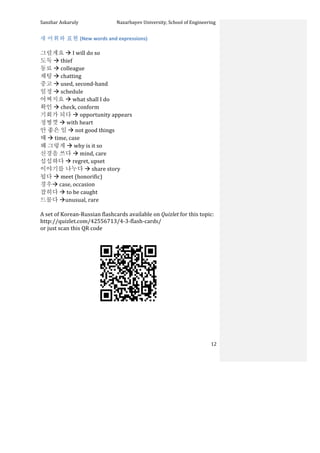
![Sanzhar
Askaruly
Nazarbayev
University,
School
of
Engineering
13
04.
결심
[Determination]
대화
1
(Dialog)
미라:
마크
씨,
여기에서
다
만나네요.
마크
씨도
이
체육관에
다녀요?
마크:
네,
저도
이번
달부터
건강을
위해서
운동을
좀
하기로
했어요.
수진:
잘
생각했어요.
건겅을
유지하기
위해서는
운동이
취고지요.
미라:
네.
그래서
매일
한
시간
이상
운동하려고요.
그런데
수진
씨는
언제부터
여기에
다녔어요?
수진:
한
육
개월쯤
됐어요.
마크:
육
개월
동안요?
와,
결심을
하기는
쉽지만
지키기는
어려운데
수진
씨
정말
대단하네요.
어휘와
표현
(Vocabulary):
결심의
목족
à
Purpose
of
determination
건강을
유지하다
à
To
keep
health
규칙적으로
생활하다
à
To
live
on
a
regular
basis
나쁜
습관을고치다
à
To
correct
bad
habit
실력을
높이다
à
To
raise
capacity/skills
좋은
송적을
받다
à
To
receive
good
mark
돈을
모으다
à
To
save
money
문
법
(Grammar):
-‐
기
위해서
à
in
order
to
…
1)
돈을
모이기
위해서
아르바이트를
하고
있어요.
2)
판사가
되기
위해서
법학과에
진학했어요.
3)
가:
시장에
가면
필요
없는
물꼰까지
사게
되는
것
같아요.
나:
필요한
물건만
사기
위해서는
쇼핀
목록을
만드는
게
좋아요.
Sanzhar Askaruly 4/22/15 6:58 PM
Comment [58]: We
meet
here.
Are
you
also
attending
gym
class,
Mr.
Mak?
Sanzhar Askaruly 4/22/15 6:58 PM
Comment [59]: I
also
just
decided
to
do
sports
from
this
month
for
health.
Sanzhar Askaruly 4/22/15 6:58 PM
Comment [60]: Good
idea.
It
is
best
to
exercise
to
maintain
health.
Sanzhar Askaruly 4/22/15 6:58 PM
Comment [61]: Therefore,
I
want
to
do
sports
more
than
1
hour
every
day.
By
the
way,
when
did
you
start
to
attend,
Sujin?
Sanzhar Askaruly 4/22/15 6:58 PM
Comment [62]: About
six
month
passed.
Sanzhar Askaruly 4/22/15 6:58 PM
Comment [63]: During
six
months?
It
is
easy
to
decide,
however
hard
to
keep,
that’s
why
you
are
really
great.
Sanzhar Askaruly 4/22/15 6:58 PM
Comment [64]: In
order
to
save
money,
I
am
doing
part-‐time
job.
Sanzhar Askaruly 4/22/15 6:58 PM
Comment [65]: In
order
to
become
judge,
I
entered
the
law
school.
Sanzhar Askaruly 4/22/15 6:58 PM
Comment [66]: When
you
go
to
market,
you
seem
to
wish
buying
unnecessary
things.
Sanzhar Askaruly 4/22/15 6:58 PM
Comment [67]: In
order
to
buy
only
needed
things,
I
like
to
prepare
list
of
things.](https://image.slidesharecdn.com/koreanlessons4-220313144001/85/Korean-Lessons-4-13-320.jpg)
![Sanzhar
Askaruly
Nazarbayev
University,
School
of
Engineering
14
대화
2
(Dialog)
민수:
로라
씨,
커피
마실래요?
로라:
아니요.
저는
괜잖아요.
민수:
웬일이에요?
로라
씨가
커피를
안
마셔요?
로라:
네.
저
이제
커피
좀
줄이기로
했어요.
커피를
너무
많이
마시니까
밤에
잠이
잘
안
오는
곳
같아요.
그래서
커피는
하루에
딱
두
전만
마실거예요.
민수:
음,
그래요.
그러면
커피
말고
다른
음료수
드릴까요?
로라:
괜찮아요.
그냥
물
마실게요.
어휘와
표현
(Vocabulary):
실천할
일
à
things
to
practice
꾸준히
운동하다
à
constantly
exercise
술을/담배를
끊다
à
stop
drinking
alcohol/smoking
커피를
줄이다
à
reduce
drinking
coffee
채소를
많이
먹다
à
eat
vegetables
a
lot
독서를
하다
à
do
reading
연습하다
à
practice
할
일을
미루지
않다
à
not
to
postpone
things
돈을
아껴
쓰다
à
use
money
within
budget
문
법
(Grammar):
-‐
에
à
per…(ex:
once
per
month,
twice
per
week)
1)
가:
한국
친구와
하루에
한
시간씩
한국어
공부를
하기로
했어요.
나:
그럼
한국어
실력이
많이
늘겠네요.
2)
가:
아주머니,
이
복숭아
어떻게
해요?
나:
세
개에
오천
원이에요.
세
개
들릴까요?
Sanzhar Askaruly 4/22/15 6:58 PM
Comment [68]: Will
you
drink
coffee?
Sanzhar Askaruly 4/22/15 6:58 PM
Comment [69]: No,
that’s
okay.
Sanzhar Askaruly 4/22/15 6:58 PM
Comment [70]: What’s
the
matter?
Don’t
you
drink
coffee?
Sanzhar Askaruly 4/22/15 6:58 PM
Comment [71]: Yes,
I
now
have
decided
to
reduce
coffee.
When
I
drink
a
lot
of
coffee,
it
seems
that
I
do
not
sleep
well
at
night.
That’s
why
I
will
drink
just
two
cup
of
coffee
a
day.
Sanzhar Askaruly 4/22/15 6:58 PM
Comment [72]: Okay,
so
will
you
drink
something
else?
Sanzhar Askaruly 4/22/15 6:58 PM
Comment [73]: I
will
drink
just
water.
Sanzhar Askaruly 4/22/15 6:58 PM
Comment [74]: We decided to study
Korean about one hour with Korean friend.
Sanzhar Askaruly 4/22/15 6:58 PM
Comment [75]: That
way
your
Korean
skill
will
much
increase.
Sanzhar Askaruly 4/22/15 6:58 PM
Comment [76]: How
much
do
these
peach
cost?
Sanzhar Askaruly 4/22/15 6:58 PM
Comment [77]: Five
thousand
wons
for
three
of
them.
Will
you
buy
three?](https://image.slidesharecdn.com/koreanlessons4-220313144001/85/Korean-Lessons-4-14-320.jpg)
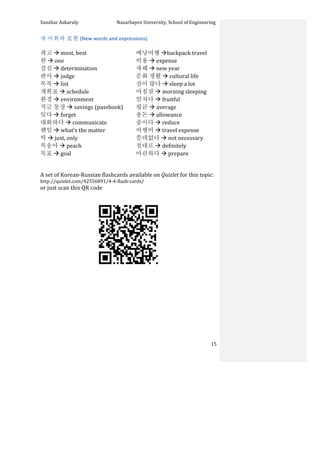
![Sanzhar
Askaruly
Nazarbayev
University,
School
of
Engineering
16
05.
문화
차이
[Cultural
difference]
대화
1
(Dialog)
유키:
민수
씨는
밥그릇을
식탁
위에
놓고
드시네요.
민수:
네.
그런데
왜요?
와,
그러고
보니까
일본에서는
밥그릇을
손에
들고
먹는
것
같네요.
유키:
네,
맞아요.
일본에서는
주로
젓가락을
사용해서
밥을
먹기
때문에
밥그릇을
손에
들고
먹어요.
민수:
아,
그렇군요.
한국
사람들은
주로
숟가락으로
밥을
먹어요.
밥그릇은
식탁
위에
놓고요.
유키:
일본에서는
숟가락을
잘
사용하지
않아요.
국을
먹을
때도
그릇을
손에
들고
국물을
마셔요.
어휘와
표현
(Vocabulary):
식사
문화
à
eating
culture
(숟가락/젓가락/포크/나이프)을/를
사용하다
à
use
spoon/chopstick/fork/knife
그릇을
손에
들고
먹다
à
eat
holding
bowl
at
hand
소리를
내면서
음식을
먹다
à
make
sound
while
eating
어른이
식사를
먼저
시작하다
à
elder
people
start
first
찌개를
같이
떠먹다
à
put
into
soup
and
eat
식탁에서
코를
풀다
à
blow
your
nose
at
the
table
(eating)
식당에서
팁을
주다
à
give
tip
in
restaurant
(waiter
fine)
문
법
(Grammar):
-‐
은/는
à
As
for…
Ex.
As
for
me,
as
for
Korean
people
1)
가:
한국에서는
식사를
할
때
숟가락을
사용해요.
나:
준국에서는
주로
젓가락으로
밥을
먹어요.
2)
한극
사람들은
채소로
만든
음식을
많이
먹어요.
라시아
사람들은요?
3)
옛날에는
여기에
작은
다리가
있었어요.
지금은
그
다리가
없어졌어요.
Sanzhar Askaruly 4/22/15 6:59 PM
Comment [78]: Please
eat
putting
rice
bowl
on
table.
Sanzhar Askaruly 4/22/15 6:59 PM
Comment [79]: Ok,
but
why?
I
discovered
that
Japanese
people
eat
by
holding
bowl
on
hands.
Sanzhar Askaruly 4/22/15 6:59 PM
Comment [80]: That’s
right.
Japanese
mainly
use
chopstick
while
eating
rice,
that’s
why
they
hold
bowl
on
hands.
Sanzhar Askaruly 4/22/15 6:59 PM
Comment [81]: Right.
Koreans
mainly
use
spoon
while
eating.
They
eat
on
table.
Sanzhar Askaruly 4/22/15 6:59 PM
Comment [82]: Japanese
do
not
use
spoon
well.
Even
when
eating
soup,
they
drink
soup
holding
bowl
on
hands.
Sanzhar Askaruly 4/22/15 6:59 PM
Comment [83]: Korean people use spoon
while eating.
Sanzhar Askaruly 4/22/15 6:59 PM
Comment [84]: Chinese
people
mainly
use
chopstick
while
eating
rice.
Sanzhar Askaruly 4/22/15 6:59 PM
Comment [85]: As
for
Korean,
they
eat
a
lot
of
food
prepared
with
vegetables.
What
about
Russians?
Sanzhar Askaruly 4/22/15 6:59 PM
Comment [86]: Long
before
there
was
a
little
bridge
here.
Not
that
bridge
does
not
exist
(dissapeared).](https://image.slidesharecdn.com/koreanlessons4-220313144001/85/Korean-Lessons-4-16-320.jpg)
![Sanzhar
Askaruly
Nazarbayev
University,
School
of
Engineering
17
대화
2
(Dialog)
마크:
수진씨,
제가
한국
친구에게서
청첩장을
받았어요.
결혼하는
친구에게
어떤
선물을
하는
게
좋아요?
수진:
한국에서는
선물을
하지
않고
결혼식
날
축의금을
내요.
마크:
축의금요?
축의금이
뭐예요?
수진:
축의금은
결혼을
축하하는
의미로
주는
돈이에요.
그런데
친구
결혼식은
어디에서
해요?
마크:
제
친구는
호텔에서
해요.
미국에서는
결혼식을
교회에서
많이
하는데
한국에서는
아닌
것
같아요.
수진:
한국도
교회에서
하는
사람들이
있어요.
그런데
보통은
호텔이나
결혼식장을
빌려서
해요.
어휘와
표현
(Vocabulary):
생활
문화
à
living
culture
결혼식
à
wedding
장례식
à
funeral
축의금을/조의금을
네다
à
pay
wedding/condolence
money
선배가
후배에가
밥을
사
주다
à
elder
buy
food
to
younger
음식
값을
각자
냐다
à
each
pays
food
value
(Dutch
pay)
한턱내다
à
treat
존댓말을
하다
à
speak
politely
반말을
하다
à
speak
informal
말을
놓다
à
official
speech
to
peers
문
법
(Grammar):
-‐
는데/(으)ㄴ데
à
Although…
Ex:
Although
I
am
younger,
I
am
taller
1)
가:
미극에도
선배가
후배에게
밥을
사
주는
문화가
있어요?
나:
아니요.
한국에는
그런
문화가
있는데
미국에서는
그렇지
않아요.
2)
동생은
키가
큰데
저는
키가
작아요.
3)
오전에는
비가
왔는데
지금은
날씨가
정말
좋아요.
Sanzhar Askaruly 4/22/15 6:59 PM
Comment [87]: I received wedding
invitation card from Korean friend. What
present is good for
Sanzhar Askaruly 4/22/15 6:59 PM
Comment [88]: In
Korea,
people
do
not
give
presents,
they
give
‘chugigym’.
Sanzhar Askaruly 4/22/15 6:59 PM
Comment [89]: What
is
‘chugigym’?
Sanzhar Askaruly 4/22/15 6:59 PM
Comment [90]: ‘Chugigym’
is
money
for
wedding
congratulation.
By
the
way,
where
is
the
wedding
of
your
friend?
Sanzhar Askaruly 4/22/15 6:59 PM
Comment [91]: My
friend
holds
at
hotel.
In
the
US,
wedding
us
held
in
church
a
lot,
but
in
Korea
it
seems
that
it
is
not
like
that.
Sanzhar Askaruly 4/22/15 6:59 PM
Comment [92]: There
are
still
people
who
hold
in
church.
By
the
way,
usually
people
rent
hotel
or
wedding
hall.
Sanzhar Askaruly 4/22/15 6:59 PM
Comment [93]: In
the
US,
is
there
culture
that
elder
buy
food
to
younger?
Sanzhar Askaruly 4/22/15 6:59 PM
Comment [94]: No.
Although
there
is
such
culture
of,
in
the
US
that
is
not
like
that.
Sanzhar Askaruly 4/22/15 6:59 PM
Comment [95]: Although
my
brother
is
tall,
I
am
short.
Sanzhar Askaruly 4/22/15 6:59 PM
Comment [96]: Although
it
was
raining
in
the
morning
(AM),
now
it
is
great.](https://image.slidesharecdn.com/koreanlessons4-220313144001/85/Korean-Lessons-4-17-320.jpg)
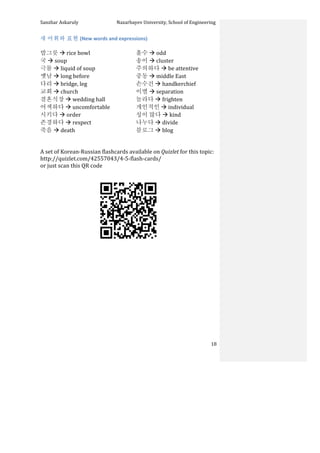
![Sanzhar
Askaruly
Nazarbayev
University,
School
of
Engineering
19
06.
감서
[Gratitude]
대화
1
(Dialog)
민수:
투이
씨,
고마워요.
투이
씨가
도와준
덕분에
일이
금방
끝났어요.
투이:
아니에요.
제가
한
일도
별로
없는데요,
뭐.
제가
더
도울
일은
없어요?
필요하면
말씀하세요.
민수:
네.
힘든
일은
다
끝났어요.
이제부터는
제가
혼자서
하면
돼요.
투이
씨,
저는
항상
투이
씨한테
도움을
받기만
하는
것
같아요.
다음에는
제가
꼭
도와
드릴게요.
투이:
그런
말
마세요.
민수
씨가
저를
도와줄
때가
더
많지요.
제가
민수
씨에게
늘
감한
마음이에요.
어휘와
표현
(Vocabulary):
감사의
이유à
reason
of
gratitude
도아주다
à
help
도움을
주다
à
give
help
도움을
받다
à
receive
help
신경을
써
주다
à
pay
attention
(care)
용기를
주다
à
motivate
일을
나누어서
하다
à
share
the
work
together
가르쳐
주다
à
show,
teach
일을
대신하다
à
do
the
work
for
somebody
부탁을
들어주다
à
give
a
favor
문
법
(Grammar):
-‐
(으)ㄴ
덕분에
à
Due
to…Ex.
Due
to
my
teacher,
I
know
Korean
better
now.
1)
가:
선생님께서
잘
가르쳐
주신
덕분에
제
영어
길력이
많이
좋아졌습니다.
나:
아니에요.
치엔
씨가
열심히
공부해서
그런
거예요.
2)
다
같이
일을
나누어서
한
덕분에
생각보다
일이
빨리
끝났어요.
3)
유키
씨가
끝까지
노력한
덕분에
이번
대회에서
일등을
한
거예요.
!
친굳들
덕분에
어려운
숙제를
금방
끝냈어요.
(Suffix
added
to
noun)
!
타완
씨
덕분에
회사
생활이
아주
즐거워요.
(Suffix
added
to
noun)
Sanzhar Askaruly 4/22/15 6:59 PM
Comment [97]: Thanks. Due to you, the
work immediately finished.
Sanzhar Askaruly 4/22/15 6:59 PM
Comment [98]: That’s
not
job
actually.
Can
I
help
you
more?
If
you
need
help,
tell
me.
Sanzhar Askaruly 4/22/15 6:59 PM
Comment [99]: The
difficult
part
is
over.
From
now
on,
I
can
do
alone.
It
seems
to
me
I
always
receive
help
from
Mr.
Tui.
Next
time
I
will
definitely
help
you.
Sanzhar Askaruly 4/22/15 6:59 PM
Comment [100]: Please,
do
not
tell
such
things.
Mr.
Minsu
helped
me
more.
I
am
grateful
for
Minsu
sincerely.
Sanzhar Askaruly 4/22/15 6:59 PM
Comment [101]: Due
teacher
who
taught
well,
my
English
skills
got
much
better.
Sanzhar Askaruly 4/22/15 6:59 PM
Comment [102]: No,
that’s
because
Chieng
studied
hard.
Sanzhar Askaruly 4/22/15 6:59 PM
Comment [103]: Because
of
working
all
together,
the
work
finished
faster
than
expected.
Sanzhar Askaruly 4/22/15 6:59 PM
Comment [104]: Due
to
efforts
till
the
end,
in
this
competition
Yuki
is
first.
Sanzhar Askaruly 4/22/15 6:59 PM
Comment [105]: Due
to
friends,
difficult
homework
is
quickly
over.
Sanzhar Askaruly 4/22/15 6:59 PM
Comment [106]: Due
Tauang,
company
life
is
much
happier
for
me.
Sanzhar Askaruly 4/22/15 6:59 PM
Comment [107]: Due
Tauang,
company
life
is
much
happier
for
me.](https://image.slidesharecdn.com/koreanlessons4-220313144001/85/Korean-Lessons-4-19-320.jpg)
![Sanzhar
Askaruly
Nazarbayev
University,
School
of
Engineering
20
대화
2
(Dialog)
미라:
타완
씨,
어제는
병원에
같이
가
줘서
정말
고마웠어요.
제가
아직
태국어를
잘
못해서
좀
걱장했었거든요.
어려운
부탁을
들어줘서
고마워요.
타완:
고맙기는요.
어려운
부탁이
아니었어요.
신경
쓰지
마세요.
미라:
고맙지요.
사실은
제가
그런
부탁을
할
사람이
타완
씨밖에
없어요.
아직
여기에
아는
사람이
별로
없어서요.
타완:
이제
그
이야기
그만하세요.
별로
도와
준
곳도
없는데
자꾸
그런
말을
하니까
제가
부끄럽네요.
어휘와
표현
(Vocabulary):
얼마나
고마운지
몰라요
à
You
do
not
know
how
much
I
am
grateful
어떻게
감사해야
할지
모르겠어요
à
I
do
not
know
how
to
thank
you
고맙기도
하고
미안하기도
해요
à
I
want
to
thank
you
and
ask
sorry
at
the
same
time
진심으로
감사드립니다
à
sincerely
grateful
고맙기는요/감사하기는요
à
there
is
nothing
that
you
can
thank
for
별말씀을요
à
nothing
special
오히려
제가
감사하지요
à
rather
I
should
thank
you
제가
한
일도
별로
없는데요
à
I
have
not
done
anything
special
문
법
(Grammar):
밖에
à
Only,
except…
Ex:
Except
you,
nobody
can
do
it.
1)
가:
고마워요.
이런
부탁을
들어줄
사람은
정우
씨밖에
없을
거예요.
나:
고맙기는요.
힘든
일이
아니니까
걱정하지
마세요.
2)
벌써
퇴근
시간이에요?
일을
반밖에
못
했는데요.
3)
아침에
우유
한
잔밖에
안
마셔서
배가
많이
고파요.
Sanzhar Askaruly 4/22/15 6:59 PM
Comment [108]: Thanks you for going
together with me to hospital yesterday.
Sanzhar Askaruly 4/22/15 6:59 PM
Comment [109]: You
should
not
thank
for
that.
That
was
not
difficult
favor.
Never
mind.
Sanzhar Askaruly 4/22/15 6:59 PM
Comment [110]: Thanks.
In
fact,
There
is
not
anybody
I
can
ask
such
favors
except
Tauang.
There
is
not
any
person
I
know
here
yet.
Sanzhar Askaruly 4/22/15 6:59 PM
Comment [111]: Please
stop
talking
such
things.
I
have
not
helped
so
much,
hence
I
am
ashamed.
Sanzhar Askaruly 4/22/15 6:59 PM
Comment [112]: There
is
not
anybody
except
Chonggu,
who
can
do
that
favor.
Sanzhar Askaruly 4/22/15 6:59 PM
Comment [113]: There
is
nothing
to
say
thanks.
Since
it
was
not
difficult
favor,
do
not
worry
please
Sanzhar Askaruly 4/22/15 6:59 PM
Comment [114]: Already
time
to
leave?
Have
not
done
half
of
the
job.
Sanzhar Askaruly 4/22/15 6:59 PM
Comment [115]: I
am
hungry,
since
I
did
not
drink
anything
except
cup
of
milk.](https://image.slidesharecdn.com/koreanlessons4-220313144001/85/Korean-Lessons-4-20-320.jpg)
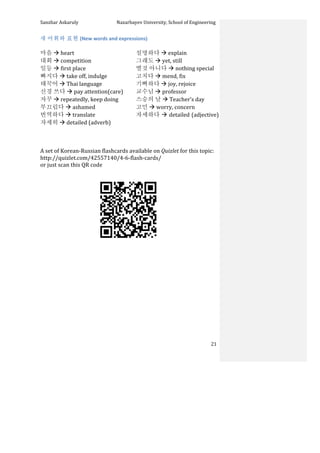
![Sanzhar
Askaruly
Nazarbayev
University,
School
of
Engineering
22
07.
공공시설
[Public
facility]
대화
1
(Dialog)
안내원:
손님,
입장
시간이
지나서
오늘은
들어가실
수
없습니다.
내일
다시
와
주세요.
유
키:
아,
그래요?
그럼
내일은
몇
시부터
관람할
수
있어요?
안내원:
9 시부터
가능합니다.
필요하시면
안내
책자를
하나
드릴까요?
유
키:
네,
감사합니다.
일본어로
된
거
있어요?
안내원:
여기
있습니다.
일본어
안내도
받을
수
있으니까
한번
보세요.
유
키:
네,
저,
그런데
근처에
지금
관람할
수
있는
다른
곳은
없을까요?
혹시
다른
박물관은
몇
시에
문을
닫는지
아세요?
안내원:
그럼
차
박물관에
가
보세요.
그곳은
늦게까지
입장이
가능합니다.
어휘와
표현
(Vocabulary):
공공시설
이용
à
use
of
public
facilities
문을
열다
à
open
the
entrance
문을
닫다
à
close
the
entrance
표를
사다/구입하다
à
buy
ticket
들어가다/입장하다
à
enter
입장료를
내다
à
pay
entrance
fee
안내
책자를
받다
à
receive
guide
leaflet
위국어로
안내를
받다
à
receive
guidance
in
foreign
language
(고궁/박물관)을
관람라다
à
view
old
palace/museum
문
법
(Grammar):
-‐
는지/(으)ㄴ지
알다/모르다
à
Do/don’t
know
whether…
1)
가:
고궁이
몇
시에
문을
여는지
알아요?
나:
아니요,
몇
시에
문을
여는지
몰라요.
2)
불고기를
먹으려고
해요.
어느
식당이
유명한지
알아요?
3)
수진
씨가
어디
갔는지
아세요?
조금
전부터
안
보이네요.
Sanzhar Askaruly 4/22/15 7:00 PM
Comment [116]: Dear
guest,
since
the
entrance
hours
passed,
you
cannot
enter.
Please
come
tomorrow
again.
Sanzhar Askaruly 4/22/15 7:00 PM
Comment [117]: Oh,
really?
So,
tomorrow
from
what
time
I
can
view?
Sanzhar Askaruly 4/22/15 7:00 PM
Comment [118]: You
can
come
from
9
o’clock.
If
you
need,
shall
I
give
guide
leaflet
to
you?
Sanzhar Askaruly 4/22/15 7:00 PM
Comment [119]: Yes,
thanks.
Do
you
have
in
Japanese
one?
Sanzhar Askaruly 4/22/15 7:00 PM
Comment [120]: Here
it
is.
In
Japanese
you
also
received,
please
look
once
more.
Sanzhar Askaruly 4/22/15 7:00 PM
Comment [121]: Okay,
by
the
way,
is
there
anything
else
I
can
view
now
nearby?
Sanzhar Askaruly 4/22/15 7:00 PM
Comment [122]: Well,
you
can
try
going
to
that
Tea
museum.
It
is
possible
that
entrance
is
open
until
late
there.
Sanzhar Askaruly 4/22/15 7:00 PM
Comment [123]: Do you know until what
time is the palace open?
Sanzhar Askaruly 4/22/15 7:00 PM
Comment [124]: No,
I
don’t
know
until
what
time
the
palace
is
open.
Sanzhar Askaruly 4/22/15 7:00 PM
Comment [125]: I
am
going
to
eat
Pulgogi.
Do
you
know
restaurant
which
is
famous
for
it?
Sanzhar Askaruly 4/22/15 7:00 PM
Comment [126]: Do
you
know
where
did
Sujin
go?
Until
now,
she
cannot
be
seen.](https://image.slidesharecdn.com/koreanlessons4-220313144001/85/Korean-Lessons-4-22-320.jpg)
![Sanzhar
Askaruly
Nazarbayev
University,
School
of
Engineering
23
대화
2
(Dialog)
직원:
안녕하세요?
무엇을
도와
드릴까요?
투이:
인터넷으로
예매한
표를
받으려면
어떻게
해야
해요?
직원:
저쪽에
있는
매표소나
자동
발급기를
이용하시면
됩니다.
투이:
그리고
케이티엑스(KTX)를
타려면
어디로
가야
해요?
직원:
바로
아래층이
타는
곳입니다.
표를
사신
후에
이쪽
에스컬레이터를
이용하여
내려가시면
됩니다.
투이:
감사합니다.
저,
그런데
KTX 에서
인터넷을
사용할수
있을까요?
직원:
네.
개인
노트북으로
인터넷을
사용하실
수
있습니다.
어휘와
표현
(Vocabulary):
예매하다
à
buy
in
advance,
book
표를
발급
받다
à
issue
a
ticket,
have
a
ticket
표를
교환하다
à
change
the
ticket
할인을
받다
à
receive
discount
짐을
맡기다
à
deposit,
keep
luggage
in
some
place
짐을
찾다
à
take
back,
collect,
redeem
무료로
이용하다
à
use
for
free,
free
of
charge
인터넷을
하다/사용하다
à
use
internet
(휴게실/흡연실)을
이용하다
à
use
smoking
room/lounge
문
법
(Grammar):
-‐(으)려면
à
If
you
want...
Ex.:
If
you
want
a
good
job,
study
hard.
1)
가:
중국어로
안내를
받으려면
어떻게
해야
해요?
나:
관람
하루
전까지
인터넷으로
예약하면
돼요.
2)
소포를
보내려면
우체국에
6 시까지
가야
해요.
3)
약속
시간에
늦지
않으려면
서두르는
것이
좋겠어요.
받(으)려면
보내려면
않(으)려면
먹(으)려면
Sanzhar Askaruly 4/22/15 7:00 PM
Comment [127]: Hello,
what
shall
I
do
for
you?
Sanzhar Askaruly 4/22/15 7:00 PM
Comment [128]: How
do
I
get
ticket
which
I
bought
in
advance
using
Internet?
Sanzhar Askaruly 4/22/15 7:00 PM
Comment [129]: You
can
go
to
ticket
office
over
there
or
use
automatic
issuing
machine
매
표
소
-‐>
buy
ticket
place
from
Chinese
Sanzhar Askaruly 4/22/15 7:00 PM
Comment [130]: So,
if
I
want
to
by
KTX,
where
shall
I
go?
Sanzhar Askaruly 4/22/15 7:00 PM
Comment [131]: Just
right
downstairs
is
that
place.
After you buy ticket, you can use
that escalator to go upstairs.
Sanzhar Askaruly 4/22/15 7:00 PM
Comment [132]: Well,
by
the
way,
can
I
use
Internet
in
KTX?
Sanzhar Askaruly 4/22/15 7:00 PM
Comment [133]: Yes,
you
can
use
Internet
with
your
personal
laptop.
Sanzhar Askaruly 4/22/15 7:00 PM
Comment [134]: What must I do if I need
to receive Chinese guide?
Sanzhar Askaruly 4/22/15 7:00 PM
Comment [135]: For
viewing
you
can
book
one
day
before.
Sanzhar Askaruly 4/22/15 7:00 PM
Comment [136]: If
I
want
to
send
package,
I
need
to
go
to
post
office
by
6
o’clock.
Sanzhar Askaruly 4/22/15 7:00 PM
Comment [137]: If
I
don’t
want
to
be
late
for
meeting,
I
think
you
had
better
hurry.](https://image.slidesharecdn.com/koreanlessons4-220313144001/85/Korean-Lessons-4-23-320.jpg)
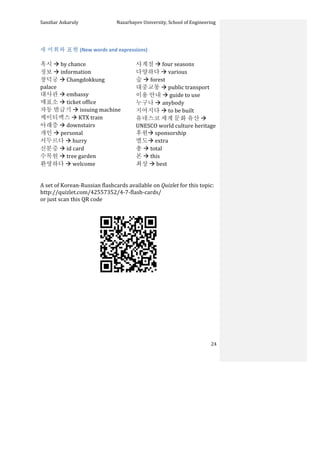
![Sanzhar
Askaruly
Nazarbayev
University,
School
of
Engineering
25
08.
예약
[Reservation]
대화
1
(Dialog)
직원:
네,
한국호텔입니다.
로라:
안녕하세요?
방을
좀
예약하고
싶은데요.
직원:
네.
언제부터
언제까지
이용하시겠습니까?
로라:
이번
달
15 일
부터
2 박을
하고
싶습니다.
직원:
네,
잠시만요.
아,
네.
그
기간에
이용하실
수
있습니다.
그러면
예약자
분의
성함을
좀
말씸해
주시겠습니까?
로라:
저는
로라
르노입니다.
직원:
네,
감사합니다.
그런데
방을
이용하실
인원은
몇
명입니까?
어휘와
표현
(Vocabulary):
예약에
필요한
정보
à
information
needed
for
reservation
성함/성명
à
more
official
of
‘name
-‐
이름’
연락처
à
contact
info
주스
à
address
인원
à
number
of
people
이용
일시
à
date
&
time
이용
기간
à
using
period
요금
à
charge
bill
[bus,
etc.]
단체/개인
à
group/individual
성인/어린이/촘소년
à
adult/children/teenager
카드/현금
à
card/cash
문
법
(Grammar):
-‐
(으)시겠습니까
à
Express
intention,
will…
1)
가:
예약하신
분의
연락처를
좀
말씀해
주시겠습니까?
나:
네,
제
휴대
전화
본호는
010-‐1234-‐5678 입니다.
2)
가:
비행기가
곧
출발합니다.
자리에
앉아
주시겠습니까?
나:
네,
알겠습니다.
Sanzhar Askaruly 4/22/15 7:00 PM
Comment [138]: Hello,
this
is
Korean
Hotel.
Sanzhar Askaruly 4/22/15 7:00 PM
Comment [139]: I
would
like
to
get
a
room
reservation.
Sanzhar Askaruly 4/22/15 7:00 PM
Comment [140]: From
when
to
when
are
you
going
to
use?
Sanzhar Askaruly 4/22/15 7:00 PM
Comment [141]: From
the
15th
of
this
month
I
want
to
use
2
nights.
Sanzhar Askaruly 4/22/15 7:00 PM
Comment [142]: Please,
hold
on.
Yes,
you
can
use
during
this
period.
So,
would
you
tell
please
the
name
of
the
person
who
intends
to
make
reservation?
Sanzhar Askaruly 4/22/15 7:07 PM
Comment [143]: My
name
is
Laura
Reno.
Sanzhar Askaruly 4/22/15 7:00 PM
Comment [144]: Yes,
thanks.
By
the
way,
would
you
tell
how
many
people
are
going
to
stay?
Sanzhar Askaruly 4/22/15 7:07 PM
Comment [145]: Would
you
tell
please
the
contact
information
of
the
person
who
made
reservation?
Sanzhar Askaruly 4/22/15 7:00 PM
Comment [146]: My
mobile
phone
number
is
010-‐1234-‐5678.
Sanzhar Askaruly 4/22/15 7:00 PM
Comment [147]: The
plane
will
depart
soon.
Would
you
please
sit
down
in
place?](https://image.slidesharecdn.com/koreanlessons4-220313144001/85/Korean-Lessons-4-25-320.jpg)
![Sanzhar
Askaruly
Nazarbayev
University,
School
of
Engineering
26
대화
2
(Dialog)
직원:
네,
세종여행사입니다.
무엇을
도와
드릴까요?
타완:
안녕하세요?
울릉도
여행을
예약하려고
하는데요.
울릉도
여행을
하면
독도
관광도
할
수
있지요?
직원:
네,
그렇습니다.
며칠에
출발하는
것으로
예약하시겠습니까?
타완:
이번
달
17 일에
출발하는
것으로
해
주세요.
직원:
잠시만요.
어,
쥐송합니다.
17 일은
이미
모두
예약이
끝났습니다.
타완:
그럼
어떻게
하지요?
그날밖에
시간이
안
되는데…
직원:
다른
사람이
예약을
취소하면
다시
연락드리겠습니다.
타완:
네,
그렇게
해
주십시요.
어휘와
표현
(Vocabulary):
예약
관련
표현
à
expression
related
to
reservation
예약하다
à
make
reservation
예매하다
à
buy
in
advance
취소하다
à
cancel
연기하다
à
postpone
선택하다
à
choose
확인하다
à
confirm
표를
구하다
à
get/buy
ticket
날짜를
바꾸다
à
change
the
date
문
법
(Grammar):
-‐(으)려고
하다
à
Decide
to,
be
about
to...
Ex.:
I
decided
to
study
hard.
1)
가:
예약한
것을
좀
취소하려고
하는데요.
나:
네.
예약하신
분
성함이
어떻게
되십니까?
2)
가:
미라
씨가
서류를
가지고
오기로
했어요?
나:
아니요.
제가
직접
가서
받으려고
해요.
Sanzhar Askaruly 4/22/15 7:00 PM
Comment [148]: Hello,
this
is
Sejong
tour
agency.
How
can
I
help
you?
Sanzhar Askaruly 4/22/15 7:08 PM
Comment [149]: I
want
to
reserve
Ulleung-‐do
trip.
When
going
to
Ulleung-‐do,
can
I
go
to
Dok-‐do
please?
Sanzhar Askaruly 4/22/15 7:00 PM
Comment [150]: Okay,
would
you
like
to
reserve
that
is
flying
in
a
few
days?
Sanzhar Askaruly 4/22/15 7:00 PM
Comment [151]: The
one
that
is
departing
on
the
17th
of
this
month.
Sanzhar Askaruly 4/22/15 7:00 PM
Comment [152]: One
minute.
Oh,
sorry,
but
the
17th
already
all
finished.
Sanzhar Askaruly 4/22/15 7:00 PM
Comment [153]: What
shall
I
do?
Only
that
days
were
OK
for
me.
Sanzhar Askaruly 4/22/15 7:00 PM
Comment [154]: If
the
other
people
will
cancel
their
trip
I
will
contact
you
again.
Sanzhar Askaruly 4/22/15 7:00 PM
Comment [155]: Yes,
please
do
so.
Sanzhar Askaruly 4/22/15 7:00 PM
Comment [156]: I
decided
to
do
cancel
the
thing
that
I
reserved
Sanzhar Askaruly 4/22/15 7:00 PM
Comment [157]: Well,
what
is
the
name
of
the
reserving
person?
Sanzhar Askaruly 4/22/15 7:00 PM
Comment [158]: Did
Mira
decide
to
bring
the
documents?
Sanzhar Askaruly 4/22/15 7:00 PM
Comment [159]: No,
when
I
go
to
her,
I
will
receive
the
documents
directly.](https://image.slidesharecdn.com/koreanlessons4-220313144001/85/Korean-Lessons-4-26-320.jpg)
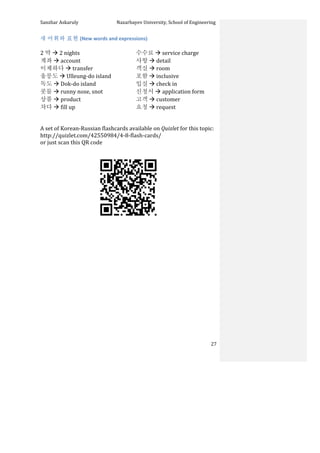
![Sanzhar
Askaruly
Nazarbayev
University,
School
of
Engineering
28
09.
경험
[Experience]
대화
1
(Dialog)
민수:
한국은
잘
다녀왔어요?
유키:
네.
서울에서
쇼핑도
하고
서울
야경도
구경했는데
정말
멋있었요.
그런데
돌아오는
날
공항
가는
보스를
잘못
타서
비행기를
놓쳤어요.
민수:
아이고,
그래서
어떻게
됐어요?
유키:
다행히
다음
비행기에
자리가
있어서
별일
없이
돌아왔어요.
민수:
많이
놀랐겠네요.
저도
배낭여행을
갔을
때
여권을
잃어버려서
많이
놀라고
고생한
적이
있어요.
어휘와
표현
(Vocabulary):
사건
à
accident/event
(버스)를
잘못
타다
à
take
the
wrong
bus
(버스)를
놓치다
à
miss
the
bus
길이
막히다
à
the
road/street
blocked
교통사고가
나다
à
traffic
accident
occur/happen
다치다
à
injure
배탈이
나다
à
stomachache
occur
길을
잃어버리다
à
get
lost
물건을
잃어버리다
à
forget/lose
things
친구를
우연히
만나다
à
meet
friend
by
chance
문
법
(Grammar):
-‐
(으)
적이
있다/없다
à
Do/don’t
have
experience
of
…
1)
가:
저는
이번
휴가
때
배탈이
나서
고생을
많이
했어요.
나:
그래요?
저도
여행을
가서
배탈이
난
적이
있어요.
2)
가:
한국
음식을
먹어
본
적이
있어요?
나:
아니요,
아직
먹어
본
적이
없어요.
Sanzhar Askaruly 4/22/15 7:00 PM
Comment [160]: Did you go to Korea well?
Sanzhar Askaruly 4/22/15 7:00 PM
Comment [161]: Yes.
In
Seoul
I
went
shopping
and
really
liked
night
view
sightseeing.
But,
on
the
day
when
I
was
going
back
I
took
the
wrong
bus
and
missed
the
plane.
Sanzhar Askaruly 4/22/15 7:00 PM
Comment [162]: So
what
was
next?
Sanzhar Askaruly 4/22/15 7:00 PM
Comment [163]: Luckily,
since
there
were
seats
in
the
next
plane,
I
returned
without
problems.
Sanzhar Askaruly 4/22/15 7:00 PM
Comment [164]: You
probably
was
a
lot
frightened.
When
I
went
backpack
travel,
since
I
lost
my
passport,
I
was
a
lot
frightened
and
had
hard
time.
Sanzhar Askaruly 4/22/15 7:00 PM
Comment [165]: Since
I
had
stomachache
this
holidays,
I
suffered
a
lot.
Sanzhar Askaruly 4/22/15 7:00 PM
Comment [166]: Really,
when
I
went
to
trip
I
also
had
stomachache
experience.
Sanzhar Askaruly 4/22/15 7:00 PM
Comment [167]: Have
you
tried
Korean
food?
Sanzhar Askaruly 4/22/15 7:00 PM
Comment [168]: No,
I
have
not
tried
yet.](https://image.slidesharecdn.com/koreanlessons4-220313144001/85/Korean-Lessons-4-28-320.jpg)
![Sanzhar
Askaruly
Nazarbayev
University,
School
of
Engineering
29
대화
2
(Dialog)
수진:
치엔
씨,
왜
이렇게
기운이
없어요?
치엔:
오전에
회사에서
중요한
발표를
했는데
실수를
했어요.
수진:
무슨
실수?
치엔:
준비한
발표
자료를
안
가져가서
필요한
설명을
다
못했어요.
그래서
발표하는
동안
긴장도
많이
했어요.
수진:
많이
당황했겠어요.
그런데
사람이
실수도
할
수
있지요.
치엔:
지금도
발표
때를
생각하면
아쉽고
속상해요.
수진:
너무
신경
쓰지
마세요.
다음에
잘하면
되지요.
우리
맛있는
거
먹고
기분
풀어요.
어휘와
표현
(Vocabulary):
감정과
심리
à
emotion
and
mind
속상하다
à
upset
슬프다
à
sad
당황하다
à
embarrassed/panic
창피하다
à
shame
아쉽다
à
regret
무섭다
à
scary/frightened
긴장하다
à
nervous
섭섭하다
à
disappointed
짜증이
나다
à
irritated
신나다
à
glad,
happy
유쾌하다
à
delight
마음이
편안하다
à
mind
comfortable/peaceful
문
법
(Grammar)
-‐는
동안
à
During,
when...
Ex.:
It
was
raining
when
we
traveled.
(+verbs
only)
1)
가:
여행을
잘
다녀오셨어요?
나:
아니요.
여행하는
동안
비가
계속
와서
구경을
잘
못했어요.
2)
저는
학교에
오는
동안
지하철에서
책을
읽어요.
3)
어머니는
우리가
자는
동안
집안일을
하셨어요.
Sanzhar Askaruly 4/22/15 7:00 PM
Comment [169]: Why
are
you
upset?
Sanzhar Askaruly 4/22/15 7:00 PM
Comment [170]: In
the
morning,
when
I
was
preparing
important
presentation,
made
a
mistake.
Sanzhar Askaruly 4/22/15 7:00 PM
Comment [171]: What
kind
of
mistake?
Sanzhar Askaruly 4/22/15 7:00 PM
Comment [172]: Since
I
did
not
bring
prepared
presentation
resources,
I
could
not
give
necessary
explanation.
Therefore,
during
the
presentation
I
was
nervous
a
lot.
Sanzhar Askaruly 4/22/15 7:00 PM
Comment [173]: You
probably
was
embarrassed
a
lot.
But
people
can
make
mistakes.
Sanzhar Askaruly 4/22/15 7:00 PM
Comment [174]: And
now,
when
I
am
thinking
of
presentation,
I
feel
regretful
and
upset.
Sanzhar Askaruly 4/22/15 7:00 PM
Comment [175]: Do
not
mind.
Next
time
you
will
do
well.
After
we
eat
delicious
food,
you
will
feel
better.
Sanzhar Askaruly 4/22/15 7:00 PM
Comment [176]: Have
you
been
travelling
well?
Sanzhar Askaruly 4/22/15 7:00 PM
Comment [177]: Nope.
During
travelling,
it
was
continuously
raining,
we
could
not
do
sightseeing
well.
Sanzhar Askaruly 4/22/15 7:00 PM
Comment [178]: I
was
reading
book
when
I
was
coming
back
from
school.
Sanzhar Askaruly 4/22/15 7:00 PM
Comment [179]: Mother
did
the
housework
when
we
were
sleeping.](https://image.slidesharecdn.com/koreanlessons4-220313144001/85/Korean-Lessons-4-29-320.jpg)
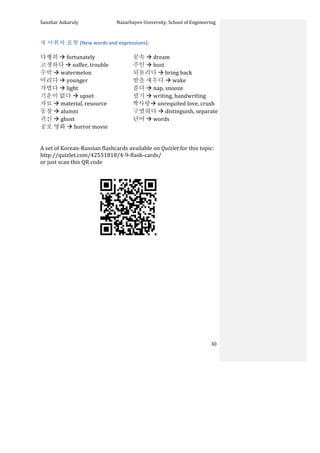
![Sanzhar
Askaruly
Nazarbayev
University,
School
of
Engineering
31
10.
요리
[Food]
대화
1
(Dialog)
정우:
로라
씨는
집에서
요리를
자주
해요?
로라:
네,
자주
해요.
저는
음식을
사
먹는
것보다
해
먹는
걸
더
좋아해요.
정우:
그래요?
그러면
제일
자주
만드는
음식이
뭐예요?
로라:
음,
글쎄요.
저는
해산물을
좋아해서
해산물로
만든
요리를
주로
해요.
새우나
조개를
넣은
스파게티를
제일
자주
해요.
정우
씨도
해산물을
좋아해요?
정우:
그럼요.
좋아하지요.
와,
음식
이야기를
하니까
배가
고파지네요.
어휘와
표현
(Vocabulary):
요리의
재료
à
ingredients
of
cuisine
채소
à
vegetable
양파
à
onion
당근à
carrot
호박
à
pumpkin
감자
à
potato
해산물
à
seafood
생선
à
fish
조개
à
shellfish,
clam
새우
à
shrimp
게
à
crab
고기
à
meat
소고기
à
beef
돼지고기
à
pork
닭고기
à
chicken
양고기
à
lamb
문
법
(Grammar):
-‐
(으)로
à
With
ingredients,
including…
1)
가:
어,
빵이
주황색이네요.
뭘로
만든
거예요?
나:
이고
당근으로
만든
거예요.
2)
고기로
만든
음식을
먹을
때는
채소를
같이
먹는
것이
좋아요.
3)
나무로
만든
책장은
좀
무거워서
플라스틱으로
만든
책장을
샀어요.
Sanzhar Askaruly 4/22/15 7:01 PM
Comment [180]: Ms.
Laura, do you often
cook at home?
Sanzhar Askaruly 4/22/15 7:01 PM
Comment [181]: Yes,
I
do.
I
rather
like
preparing
than
eating
food.
Sanzhar Askaruly 4/22/15 7:01 PM
Comment [182]: Is
it?
Then
what
is
the
food
you
most
often
cook?
Sanzhar Askaruly 4/22/15 7:01 PM
Comment [183]: Well.
Since
I
like
seafood,
I
usually
cook
food
including
sea
products.
Mostly
I
prepare
spaghetti
with
shrimps
or
shellfish
[clam].
Do
you
also
like
seafood,
Mr.
Woo?
Sanzhar Askaruly 4/22/15 7:01 PM
Comment [184]: That’s
right,
I
like
it.
While
speaking
about
seafood,
I
started
feeling
hungry.
Sanzhar Askaruly 4/22/15 7:01 PM
Comment [185]: The bread seems orange.
What was it made of?
Sanzhar Askaruly 4/22/15 7:01 PM
Comment [186]: It
is
made
of
carrot.
Sanzhar Askaruly 4/22/15 7:01 PM
Comment [187]: I
like
eating
meat
with
added
vegetable
ingredients.
Sanzhar Askaruly 4/22/15 7:01 PM
Comment [188]: Since
the
bookshelf
made
of
wood
is
a
bit
heavy,
bought
the
one
made
of
plastic.](https://image.slidesharecdn.com/koreanlessons4-220313144001/85/Korean-Lessons-4-31-320.jpg)
![Sanzhar
Askaruly
Nazarbayev
University,
School
of
Engineering
32
대화
2
(Dialog)
타완:
수진
씨,
불고기는
만들기
어려워요?
저도
할수
있을까요?
수진:
불고기요?
별로
어렵지
않아요.
타완
씨도
할
수
있을
거예요.
일단
소고기
하고
당근,
양파,
버섯
같은
재료가
필요해요.
타완:
소고기,
당근,
양파,
버섯
…
그리고요?
수진:
먼저
소고기에
양념을
해야
해요.
소고기에
배즙,
간장,
설탕,
마늘을
같이
넣어
잘
섞고
나서
두
시간
정도
두세요.
나중에
그걸
볶으면
되는데,
그때
당근,
양파,
버섯을
넣으시면
돼요.
그리고
간을
맞추면
끝이에요.
타완:
그래요?
생각보다
간단하네요.
집에서
한번
해
볼게요.
어휘와
표현
(Vocabulary):
요리
방법
à
cooking
method
다듬다
à
trim
썰다
à
chop,
slice
자르다
à
to
sever,
cut
깎다
à
pare
다지다
à
crush,
granulate
굽다
à
bake
볶다
à
fry
튀기다
à
deep
fry
끓이다
à
boil
찌다
à
steam
문
법
(Grammar):
-‐고
나서
à
After
doing
...
Ex:
After
trimming
vegetables,
fry
them
1)
먼저
생선에
양념을
하고
나서
그
다음에
구워
보세요.
2)
우선
채소를
썰고
나서
다른
재료를
준비하는
게
좋겠어요.
3)
가:
수진
씨,
지금
점심
먹으러
갈래요?
나:
서류
정리를
끝내고
나서
점심
먹으러
가면
어떨까요?
Sanzhar Askaruly 4/22/15 7:01 PM
Comment [189]: Sujin, is it difficult
cooking Bulgogi? Can I also do it?
Sanzhar Askaruly 4/22/15 7:01 PM
Comment [190]: Bulgogi?
Not
very
difficult.
Tawan
can
also
do
it.
Once
you
need
ingredients
such
as
beef,
carrot,
onion,
mushroom.
Sanzhar Askaruly 4/22/15 7:01 PM
Comment [191]: Beef,
carrot,
onion,
mushroom…Then?
Sanzhar Askaruly 4/22/15 7:01 PM
Comment [192]: First,
you
should
season
your
beef.
Put
your
pear
juice,
soy
sauce,
sugar,
garlic
into
meat,
mix
it
and
wait
for
about
two
hours
under
temperature.
Later
after
you
wait
you
can
put
carrot,
onion,
mushroom.
Then
it
is
finished.
Sanzhar Askaruly 4/22/15 7:01 PM
Comment [193]: Is
it?
Sounds
easier
than
I
thought.
I
will
try
once
at
home.
Sanzhar Askaruly 4/22/15 7:01 PM
Comment [194]: First, season the fish, and
next please bake it
Sanzhar Askaruly 4/22/15 7:01 PM
Comment [195]: Slice
Sanzhar Askaruly 4/22/15 7:01 PM
Comment [196]: Sujin,
are
you
going
to
have
lunch?
Sanzhar Askaruly 4/22/15 7:01 PM
Comment [197]: How
about
going
to
lunch
after
I
finish
filling
out?](https://image.slidesharecdn.com/koreanlessons4-220313144001/85/Korean-Lessons-4-32-320.jpg)
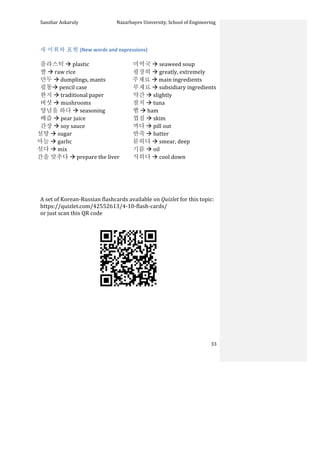
![Sanzhar
Askaruly
Nazarbayev
University,
School
of
Engineering
34
11.
영화와
드라마
[Movie&Drama]
대화
1
(Dialog)
정우:
로라
씨,
시간
있으면
같이
영화
보러
갈까요?
로라:
좋아요.
그런데
무슨
영화를
볼
거예요?
정우:
글쎄요.
로라
씨는
어떤
영화를
좋아해요?
로라:
저는
‘첫사랑’같이
아름답고
슬픈
사랑
이야기를
좋아해요.
그런
영화는
배우들도
멋있지만
영상도
그림같이
아름답거든요.
정우:
음,
그럼
우리
이번에
‘건축학개론’을
볼까요?
주인공들의
대학교
때
사랑
이야기인데,
아마
로라
씨
마음에
들
거예요.
로라:
저도
얼마
전에
그
영화
이야기를
들었어요.
우리
그
영화를
보러
가요.
어휘와
표현
(Vocabulary):
제목
à
title
내용
à
content
줄거리
à
synopsis/story
line
배경
à
background
감독
à
director
배우
à
actor
연기자
à
performer
주인공
à
hero
시청자
à
viewer
관객
à
audience
영화
감상
à
movie
appreciation
영화
음악
à
soundtrack
문
법
(Grammar):
…
같이
à
Such
as
…/
like
…
1)
가:
어떤
영화를
좋아해요?
나:
‘로미오와
줄리엣’같이
슬픈
영화를
좋아해요.
2)
가:
타완
씨는
한국어를
참
잘하는
것
같아요.
나:
저도
그렇게
생각해요.
타완
씨는
한국
사람같이
말해요.
Sanzhar Askaruly 4/22/15 7:01 PM
Comment [198]: Laura,
when
you
have
time,
shall
we
go
to
watch
movie?
Sanzhar Askaruly 4/22/15 7:01 PM
Comment [199]: I
like
it.
But
what
kind
of
movie
shall
we
watch?
Sanzhar Askaruly 4/22/15 7:01 PM
Comment [200]: Well.
What
movie
would
Laura
like?
Sanzhar Askaruly 4/22/15 7:01 PM
Comment [201]: I like beautiful and sad
love stories such as ‘First Love’. In this movie,
actors are pretty, also images are like in the
picture, very beautiful.
Sanzhar Askaruly 4/22/15 7:01 PM
Comment [202]: Maybe
this
time
we
will
see
‘Introduction
of
architecture’?
It
tells
about
love
during
performers
are
students,
probably
Laura
will
like
it.
Sanzhar Askaruly 4/22/15 7:01 PM
Comment [203]: I
also
heard
about
this
movie
recently.
Let’s
go
to
see
that
movie.
Sanzhar Askaruly 4/22/15 7:01 PM
Comment [204]: What
kind
of
movie
do
you
like?
Sanzhar Askaruly 4/22/15 7:01 PM
Comment [205]: I
like
sad
movies
such
as
‘Romeo
and
Juliet’
Sanzhar Askaruly 4/22/15 7:01 PM
Comment [206]: Tawan
seems
to
speak
Korean
really
well.
Sanzhar Askaruly 4/22/15 7:01 PM
Comment [207]: I
also
think
so.
Tawan
speaks
like
Korean
people.](https://image.slidesharecdn.com/koreanlessons4-220313144001/85/Korean-Lessons-4-34-320.jpg)
![Sanzhar
Askaruly
Nazarbayev
University,
School
of
Engineering
35
대화
2
(Dialog)
투이:
민수
씨도
어제
'대장금'
봤어요?
어제
내용도
정말
재미있었지요?
민수:
네.
저도
재미있게
봤어요.
투이:
요짐은
친구들도
그
드라마
이야기만
해요.
드라마가
정말
인기
있는
것
같아요.
민수:
늘
다른
사람을
먼저
생각하는
주인공의
이야기가
감동적이잖아요.
투이:
저는
여러
가지
한국
음식을
볼
수
있는
것도
아주
흥무로워요.
민수:
맞아요.
배우들도
연기를
잘하고요.
투이:
인기
있는
이유가
정말
많네요.
그런
걸
생각하면
시청률이
높은
게
당연해요.
어휘와
표현
(Vocabulary):
인기의
이유
à
reason
for
popularity
감동적이다
à
touching
인상적이다
à
impressive
흥무럽다
à
exciting
신나다
à
delighting
새롭다
à
fresh,
new
연기를
잘하다
à
do
acting
well
영상이
아름답다
à
screen,
image
beautiful
기억에
오래
남다
à
memory
for
long
time
문
법
(Grammar):
-‐잖아요
à
As
you
know
…
1)
가:
‘대장금’은
인기가
참
많은
것
같아요.
나:
주인공이
성공하는
이야기가
감동적이잖아요.
2)
가:
왜
요즘은
크기가
큰
휴대
전화가
인기일까요?
나:
요즘은
휴대
전화로
영화나
책을
많이
보잖아요.
화면이
크면
보기가
편하니까요.
Sanzhar Askaruly 4/22/15 7:01 PM
Comment [208]: Minsu, did you see
‘Great Jang Geum’? Yesterday content was
really exciting, wasn’t it?
Sanzhar Askaruly 4/22/15 7:01 PM
Comment [209]: Yes,
I
also
think
it
was
exciting.
Sanzhar Askaruly 4/22/15 7:01 PM
Comment [210]: Recently I talk with my
friends about that drama. That drama seems to
be very popular.
Sanzhar Askaruly 4/22/15 7:01 PM
Comment [211]: It
is
touching
that
main
hero
always
thinks
about
others
first.
Sanzhar Askaruly 4/22/15 7:01 PM
Comment [212]: As
for
me,
it
was
exciting
to
see
various
Korean
food.
Sanzhar Askaruly 4/22/15 7:01 PM
Comment [213]: That’s
right.
Actors
also
played
well.
Sanzhar Askaruly 4/22/15 7:01 PM
Comment [214]: There
are
lots
of
reasons
to
be
popular.
If
thinking
like
that,
no
wonder
the
ratings
are
high.
Sanzhar Askaruly 4/22/15 7:01 PM
Comment [215]: It seem ‘Great Jang
Geum’ is very popular.
Sanzhar Askaruly 4/22/15 7:01 PM
Comment [216]: The
hero
seems
successfully
telling
touching
story.
Sanzhar Askaruly 4/22/15 7:01 PM
Comment [217]: Why
recently
are
big
size
mobile
phones
are
popular?
Sanzhar Askaruly 4/22/15 7:01 PM
Comment [218]: It
seems
recently
people
watch
movies
and
read
books.
Big
screen
is
comfortable
for
watching.](https://image.slidesharecdn.com/koreanlessons4-220313144001/85/Korean-Lessons-4-35-320.jpg)
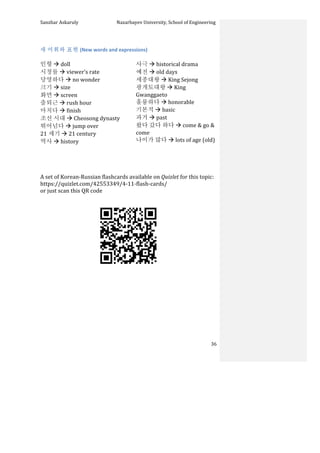
![Sanzhar
Askaruly
Nazarbayev
University,
School
of
Engineering
37
12.
패션
[Fashion]
대화
1
(Dialog)
유키:
민수
씨,
오늘
멋진데요.
민수
씨는
양복이
정말
잘
어울리네요.
민수:
고마워요.
그런데
양복을
입으니까
좀
불편한
것
같아요.
유키:
그렇지요?
매일
편한
바지에다가
티셔츠만
입었으니까요.
그렇지만
오늘
같은
날
아니면
언제
또
정장을
입겠어요?
민수:
그런데
유키
씨도
오늘
정말
예쁜데요.
특히
이
스카프를
하니까
아주
분위기
있어요.
유키:
진짜요?
고마워요.
그런데
우리
서로
칭찬은
그만하고
어서
가요.
결혼식에
늦겠어요.
어휘와
표현
(Vocabulary):
옷과
액세서리
à
clothes
and
accessory
정장
à
formal
dress
양복
à
suit
한복
à
Korean
traditional
Hanbok
운동복
à
sports
wear
청바지
à
jeans
면바지
à
cotton
pants
목도리
à
neckerchief,
scarf
넥타이
à
tie
허리띠
à
belt
목걸이
à
necklace
귀걸이
à
earring
팔찌
à
bracelet
반지
à
ring
문
법
(Grammar):
…
에다가
à
In
addition
to
…
1)
가:
셔츠가
파란색이니까
이
넥타이를
해
보세요.
나:
음,
여기에다가
이
넥타이를
하니까
정말
잘
어울리네요.
2)
가:
과자
좀
더
드실래요?
나:
또요?
안
돼요.
밥에다가
후식까지
먹어서
너무
배불러요.
Sanzhar Askaruly 4/25/15 3:13 AM
Comment [219]: Minsu,
today
you
are
pretty.
Suit
fits
really
well.
Sanzhar Askaruly 4/25/15 3:13 AM
Comment [220]: Thanks.
But
because
of
wearing
suit,
it
seems
I
feel
a
bit
uncomfortable.
Sanzhar Askaruly 4/25/15 3:13 AM
Comment [221]: Is
it?
This
should
be
because
you
wear
comfortable
pants
and
T-‐
shirt
everyday.
If
not
days
like
today,
when
else
would
you
wear
official
cloth?
Sanzhar Askaruly 4/25/15 3:13 AM
Comment [222]: By
the
way,
Yuki
is
also
really
beautiful.
Especially,
that
wearing
this
scarf
has
some
atmosphere
[charm].
Sanzhar Askaruly 4/25/15 3:13 AM
Comment [223]: Really?
Thanks.
By
the
way,
let’s
stop
praising
each
other
and
go.
We
will
be
late
for
wedding.
Sanzhar Askaruly 4/25/15 3:13 AM
Comment [224]: Since your shirt is blue,
try to wear this tie.
Sanzhar Askaruly 4/25/15 3:13 AM
Comment [225]: Well,
wearing
tie
with
this
fits
really
well.
Sanzhar Askaruly 4/25/15 3:13 AM
Comment [226]: Will
you
eat
more
sweets?
Sanzhar Askaruly 4/25/15 3:13 AM
Comment [227]: More?
No.
Apart
from
meal,
I
had
dessert,
therefore
I
am
full.](https://image.slidesharecdn.com/koreanlessons4-220313144001/85/Korean-Lessons-4-37-320.jpg)
![Sanzhar
Askaruly
Nazarbayev
University,
School
of
Engineering
38
대화
2
(Dialog)
로라:
미라
씨,
어제
옷도
검은색이었는데
오늘도
검은색이네요.
미라
씨
옷
중에는
검은색
옷이
참
많은
것
같아요.
미라:
에,
맞아요.
저는
검은색
옷을
즐겨
입는
편이에요.
로라:
그런데
검은색
옷을
즐겨
입는
이우가
있어요?
미라:
별건
없어요.
저는
옷에
별로
신경
쓰지
않는
편이거든요.
검은색
옷은
여러
옷에
다
잘
어울리니까
바쁠
때
그냥
아무거나
입고
나갈
수
있잖아요.
그래서
편해요.
어휘와
표현
(Vocabulary):
패션과
관련된
성향
à
fashion
related
tendency
옷을
잘
입다
à
wear
clothes
well
옷을
못
입다
à
do
not
wear
clothes
well
즐겨
입다
à
enjoy
wearing
유행을
따르다
à
follow
the
fashion
유행에
뒤처지다
à
lag
behind
fashion
개성이
있다
à
have
individuality
패션에
관심이
많다
à
interested
in
fashion
a
lot
옷에
신경
쓰지
않다
à
do
not
care
about
clothes
상황에
맞게
옷을
입다
à
wear
correct
clothes
according
to
situation
문
법
(Grammar):
-‐는/(으)ㄴ
편이다
à
Tend
to
…
1)
가:
수진
씨는
패션에
관심이
많은
편인
것
같아요.
나:
네,
정말
그런
것
같아요.
수진
씨는
항상
옷을
잘
입고
다녀요.
2)
가:
저
식당
음식
정말
맛있는
것
같아요.
나:
네,
맛있어요.
그래서
저도
자주
가는
편이에요.
Sanzhar Askaruly 4/25/15 3:13 AM
Comment [228]: Mira,
yesterday
you
were
in
black
and
today
also
you
are
in
black.
It
seems
like
Mira
has
a
lot
of
black
clothes.
Sanzhar Askaruly 4/25/15 3:13 AM
Comment [229]: Right.
I
tend
to
wear
black
clothes.
Sanzhar Askaruly 4/25/15 3:13 AM
Comment [230]: Do
you
have
reason
for
wearing
black?
Sanzhar Askaruly 4/25/15 3:13 AM
Comment [231]: No
specific
reason.
I
do
not
care
much
about
clothing.
Since
black
cloth
fits
well
with
various
clothes,
when
I
am
busy,
I
can
just
wear
anything
and
go
out.
Therefore
comfortable.
Sanzhar Askaruly 4/25/15 3:13 AM
Comment [232]: It
seems
that
Sujin
tend
to
be
interested
in
fashion
a
lot.
Sanzhar Askaruly 4/25/15 3:13 AM
Comment [233]: That
seems
to
be
true.
Sujin
always
wears
clothes
well.
Sanzhar Askaruly 4/25/15 3:13 AM
Comment [234]: It
seems
that
food
in
that
restaurant
is
very
delicious.
Sanzhar Askaruly 4/25/15 3:13 AM
Comment [235]: Yes,
delicious.
Therefore,
I
also
tend
to
go
often
there.](https://image.slidesharecdn.com/koreanlessons4-220313144001/85/Korean-Lessons-4-38-320.jpg)
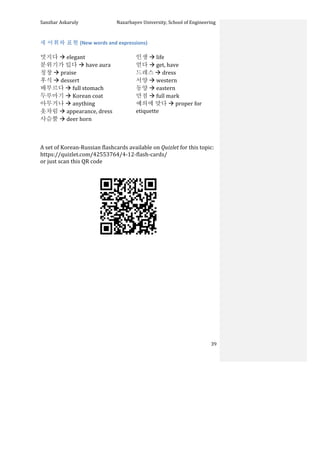
![Sanzhar
Askaruly
Nazarbayev
University,
School
of
Engineering
40
13.
성격
[Personality]
대화
1
(Dialog)
투이:
치엔
씨는
성격이
참
좋은
것
같아요.
민수:
그렇지요?
저도
그렇게
생각해요.
성격이
참
활발하고
전극적인
것
같아요.
투이:
그리고
치엔
씨는
일이
많고
바쁠
때도
항상
여유가
있어
보여요.
민수:
정말
그래요.
그래서
저는
치엔
씨의
여유
있는
성격이
항상
부러워요.
저는
성격이
좀
급한
편이거든요.
투이:
민수
씨의
성격이
급해요?
전혀
안
그래
보이는데요.
민수:
아니에요.
성격이
급하고
또
덤벙댈
때도
많아서
실수를
자주
해요.
어휘와
표현
(Vocabulary):
성격
à
personality
성격이
좋다/나쁘다
à
good/bad
personality
착하다
à
nice,
good
활발하다
à
active
조용하다
à
quiet
성격이
급하다
à
impatient
여유가
있다
à
have
calmness
꼼꼼하다
à
careful
덤벙대다
à
careless
적극적이다
à
proactive
소극적이다
à
passive
내성적이다
à
introvert
외향적이다
à
extravert
문
법
(Grammar):
-‐아/어
보이다
à
Look,
seem…
Ex:
He
looks
calm.
1)
가:
로라
씨는
성격이
참
활발해
보여요.
나:
네,
제가
좀
활발한
편이에요.
2)
무슨
일
이었어요?
얼굴이
좀
안
좋아
보여요.
3)
이거버다
큰
옷도
있어요?
이
옷은
저한테
좀
작아
보여요.
Sanzhar Askaruly 4/25/15 3:13 AM
Comment [236]: It
seems
like
Chieng’s
personality
is
good.
Sanzhar Askaruly 4/25/15 3:13 AM
Comment [237]: Isn’t
it?
I
also
think
so.
Personality
seems
really
active
and
proactive.
Sanzhar Askaruly 4/25/15 3:13 AM
Comment [238]: Also
when
Chieng
is
busy
with
a
lot
of
work,
he
always
looks
calm.
Sanzhar Askaruly 4/25/15 3:13 AM
Comment [239]: Really
true.
Also
I
envy
Chieng’s
calmness.
My
personality
tends
to
be
impatient.
Sanzhar Askaruly 4/25/15 3:13 AM
Comment [240]: Are
you
Minsu
impatient?
You
do
not
look
that
way.
Sanzhar Askaruly 4/25/15 3:13 AM
Comment [241]: No.
Personality
impatient
and
very
careless
,
therefore
I
often
make
mistakes.
Sanzhar Askaruly 4/25/15 3:13 AM
Comment [242]: Laura’s personality
seems very active.
Sanzhar Askaruly 4/25/15 3:13 AM
Comment [243]: Yes,
I
tend
to
be
active.
Sanzhar Askaruly 4/25/15 3:13 AM
Comment [244]: What
happened?
Your
face
does
not
look
happy.
Sanzhar Askaruly 4/25/15 3:13 AM
Comment [245]: Do
you
have
bigger
cloth
than
this?
This
cloth
seems
to
be
short
for
me.](https://image.slidesharecdn.com/koreanlessons4-220313144001/85/Korean-Lessons-4-40-320.jpg)
![Sanzhar
Askaruly
Nazarbayev
University,
School
of
Engineering
41
대화
2
(Dialog)
수진:
타완
씨는
성격이
좋아서
친구를
금방
사귈
것
같아요.
타완:
글쎄요.
제가
성격이
좋은지는
잘
모르겠지만
친구를
금방
사귀는
것은
맞아요.
수진:
좋겠어요.
저는
성격이
별로
적극적인
편이
아느라서
친구를
사귈
때
시간이
좀
오래
걸려요.
타완:
그래도
수진
씨는
친구가
굉장히
많지
않아요?
수진:
네.
조금
많은
편이에요.
타완:
수진
씨하고
친구가
되고
싶어하는
사람도
많을
거예요.
어휘와
표현
(Vocabulary):
성향
à
tendency
친구를
잘
사귀다
à
make
friends
well
사람들하고
잘
어울리다
à
get
along
well
with
others
이행심이
많다
à
considerate,
understanding
말을
잘
안하다
à
do
not
speak
much,
introvert
말을
많이
하다
à
speak
a
lot
부끄러움을
타다
à
fell
shyness
고집이
세다
à
stubborn
남의
말을
잘
듣다
à
listen
to
others
well
문
법
(Grammar):
-‐(으)ㄹ
것
같다
à
It
seems
like
…Ex:
It
seems
like
rain
will
go.
1)
가:
진우
씨는
어떤
사람이에요?
표정을
보면
고집이
좀
셀
것
같아요.
나:
그래
보이지요?
그렇지만
진우
씨는
사실
고집이
별로
게지
않아요.
2)
구름도
잔뜩
끼고
바람도
많이
부네요.
비가
올
것
같아요.
3)
차가
너무
막혀서
약속
시간까지
도착하지
못할
것
같아요.
Sanzhar Askaruly 4/25/15 3:13 AM
Comment [246]: Since
Tawan’s
personality
is
good,
you
seem
to
make
friends
immediately.
Sanzhar Askaruly 4/25/15 3:13 AM
Comment [247]: Well.
I
do
not
know
whether
my
personality
is
good
or
bad,
but
it
is
true
that
I
make
friends
immediately.
Sanzhar Askaruly 4/25/15 3:13 AM
Comment [248]: Very
good.
My
personality
is
not
proactive,
hence
it
takes
longer
for
me
to
make
friends.
Sanzhar Askaruly 4/25/15 3:13 AM
Comment [249]: Still
Sujin
you
have
extremely
many
friends,
don’t
you?
Sanzhar Askaruly 4/25/15 3:13 AM
Comment [250]: Yes.
I
tend
to
have
a
bit
more.
Sanzhar Askaruly 4/25/15 3:13 AM
Comment [251]: From
other
people’s
sayings,
Sujin
listens
and
understands
others
well.
Therefore,
there
are
a
lot
of
people
who
want
to
become
friends
with
you.
Sanzhar Askaruly 4/25/15 3:13 AM
Comment [252]: What
kind
of
person
is
Ching
Woo?
It
seem
he
is
a
bit
stubborn
from
face
expression.
Sanzhar Askaruly 4/25/15 3:13 AM
Comment [253]: Appears
like
that?
In
reality
Ching
Woo
is
not
stubborn
at
all.
Sanzhar Askaruly 4/25/15 3:13 AM
Comment [254]: There
are
a
bunch
of
clouds
and
wind
is
blowing.
It
seems
that
rain
will
go.
Sanzhar Askaruly 4/25/15 3:13 AM
Comment [255]: Because of a heavy
traffic, it seems that I cannot arrive to meeting
on time.](https://image.slidesharecdn.com/koreanlessons4-220313144001/85/Korean-Lessons-4-41-320.jpg)
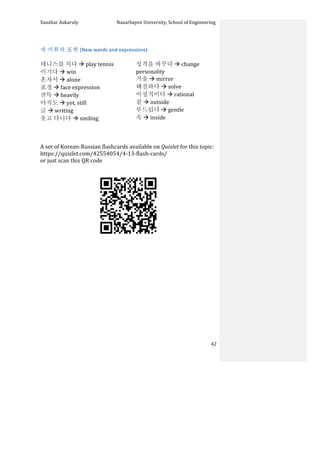
![Sanzhar
Askaruly
Nazarbayev
University,
School
of
Engineering
43
14.
소감
[Opinion]
대화
1
(Dialog)
유키:
한국어
공부를
시작한
지
얼마
안
된
것
같은데
어느새
4 권을
다
공부했네요.
타완:
그러게요.
벌써
마지막
단원이에요.
힘든
적도
있었지만
역시
계속
공부하
것은
잘한
일
같아요.
이제는
한국어
공부에
자신감도
생겼고요.
유키:
저는
처음에
‘책상’하고
‘’
빨음도
어려웠어요.
1 권을
공부할
때
시디(CD)를
들으면서
얼마나
열심히
연습했는지
몰라요.
타완:
그래서
지금은
이렇게
한국어를
잘하잖아요.
유키
씨는
다음
학기에도
계속
한국어를
공부할
거지요?
유키:
네.
학교
다니면서
한국어를
공부하는
게
쉽지
않지만
계속
할
생각이에요.
어휘와
표현
(Vocabulary):
공부
à
study,
learning
노력하다
à
try
hard
외우다
à
memorize
반복하다
à
repeat
따라
하다
à
repeat
after
somebody
이행하다
à
understand
실력이
늘다
à
develop,
increase
skills
자신감이
생기다
à
gain
confidence
시간이
부족하다
à
not
enough
time
관심을
가지다
à
have
interest
방법을
찾다
à
look
up,
explore
문
법
(Grammar):
얼마나
–는지/(으)ㄴ지
모르다
à
Do
not
know
how
…
1)
가:
로라
씨는
한국어를
참
빨리
배우는
것
같아요.
나:
맞아요.
배운
지
일
년밖에
안
됐는데
실력이
얼마나
빨리
늘었는지
몰라요.
2)
도와줘서
얼마나
고마운지
모르겠어요.
3)
수진
씨가
얼마나
괜찮은
사람인지
몰라요.
성격도
좋고
일도
잘
하고요.
Sanzhar Askaruly 4/25/15 10:42 AM
Comment [256]: It
does
not
seem
long
since
we
started
learning
Korean,
but
have
already
studied
4th
volume.
Sanzhar Askaruly 4/25/15 10:42 AM
Comment [257]: Right.
Already
the
last
unit.
It
was
difficult
experience,
but
it
seems
we
have
done
a
good
job
on
studying
continuously.
Sanzhar Askaruly 4/25/15 10:42 AM
Comment [258]: In
the
beginning
it
was
difficult
to
pronounce
‘책상’
and
‘김치’.
When
we
studied
1st
volume,
during
listening
to
CD,
you
do
not
know
how
much
I
practiced
listening.
Sanzhar Askaruly 4/25/15 10:42 AM
Comment [259]: Therefore
you
speak
Korean
well
now.
Yuki,
are
you
going
to
continue
studying
Korean?
Sanzhar Askaruly 4/25/15 10:42 AM
Comment [260]: Yes.
It
is
not
easy
to
attend
school
and
learn
Korean,
but
I
am
thinking
to
continue.
Sanzhar Askaruly 4/25/15 10:42 AM
Comment [261]: Laura,
it
seems
that
you
learnt
Korean
fast.
Sanzhar Askaruly 4/25/15 10:42 AM
Comment [262]: Right.
It
has
not
passed
a
year,
but
I
do
not
know
how
fast
skills
have
increased.
Sanzhar Askaruly 4/25/15 10:42 AM
Comment [263]: I
do
not
know
how
much
I
should
thank
you
for
helping.
Sanzhar Askaruly 4/25/15 10:42 AM
Comment [264]: I
do
not
know
how
good
is
Sujin.
Personality
is
good
and
works
well.](https://image.slidesharecdn.com/koreanlessons4-220313144001/85/Korean-Lessons-4-43-320.jpg)
![Sanzhar
Askaruly
Nazarbayev
University,
School
of
Engineering
44
대화
2
(Dialog)
선생님:
투이
씨,
그동안
한국어
실력이
많이
늘었네요.
투이:
감사합니다.
모두
선생님
덕분이에요.
선생님께서
친절하게
가르쳐
주셔서
한국어
공부가
전말
즐거웠어요.
선생님:
고마워요.
저도
투이
씨가
노력하는
모습을
보고
기뺐어요.
투이:
네,
저도
한국어
공부가
재미있어서
시간
있을
때마다
열심히
했어요.
선생님:
투이
씨는
언어에
소질이
있는
것
같아요.
머리도
좋고요.
투이:
머리가
좋기는요.
아니에요.
매일
반복해서
단어를
외우지만
자꾸
잊어버려서
노력을
많이
해야
돼요.
어휘와
표현
(Vocabulary):
칭찬
à
praise
발음이
좋다/정확하다
à
pronunciation
good/accurate
머리가
좋다
à
smart
자신감이
있다
à
have
confidence
유머
감각이
있다
à
have
sense
of
humor
부지런하다
à
diligent,
hard-‐working
마음이
넓다
à
kind
마음이
따뜻하다
à
warm
heart
친절하다
à
sincere
예의가
바르다
à
have
good
manners
목서리가
좋다/예쁘다
à
beautiful
voice
문
법
(Grammar):
-‐기는요
à
It
is
not
because
…
1)
가:
참
부지런하시네요.
회사
일도
열심히
하고
한국어
공부도
하고요.
나:
부지런하기는요.
퇴근
후에
잠깐씩
공부하는
거예요.
2)
가:
마크
씨는
전말
마음이
넓은
것
같아요.
지금까지
화내는
걸
본
적이
없어요.
나:
마음이
넓기는요.
젛은
사람들이
옆에
있어서
화낼
일이
없는
거지요.
Sanzhar Askaruly 4/25/15 10:42 AM
Comment [265]: Tui, meanwhile your
Korean skills developed a lot.
Sanzhar Askaruly 4/25/15 10:42 AM
Comment [266]: Thank
you.
All
because
of
teacher.
Because
the
teacher
sincerely
taught
us,
I
really
enjoyed
learning
Korean.
Sanzhar Askaruly 4/25/15 10:42 AM
Comment [267]: Thank
you.
But
I
have
noticed
Tui
made
a
lot
out
of
class
effort.
Sanzhar Askaruly 4/25/15 10:42 AM
Comment [268]: Yes,
because
I
was
interested
in
learning
Korean,
when
I
had
time,
I
tried
hard.
Sanzhar Askaruly 4/25/15 10:42 AM
Comment [269]: Tiu,
you
seem
to
have
language
aptitude.
You
are
smart.
Sanzhar Askaruly 4/25/15 10:42 AM
Comment [270]: No,
I
am
not
smart,
no.
Despite
that
everyday
I
repeatedly
memorized
the
words,
I
forgot
them
fast,
therefore
I
had
to
put
a
lot
effort.
Sanzhar Askaruly 4/25/15 10:42 AM
Comment [271]: You
are
very
diligent.
In
the
company
you
work
well
and
speak
Korean
also
well.
Sanzhar Askaruly 4/25/15 10:42 AM
Comment [272]: It
is
not
because
I
am
diligent.
I
just
study
immediately
after
work
finishes.
Sanzhar Askaruly 4/25/15 10:42 AM
Comment [273]: Mak,
you
are
really
kind.
I
have
never
seen
you
angry.
Sanzhar Askaruly 4/25/15 10:42 AM
Comment [274]: It
is
no
because
I
am
kind.
When
good
people
are
next
to
me,
there
is
no
need
to
be
angry.](https://image.slidesharecdn.com/koreanlessons4-220313144001/85/Korean-Lessons-4-44-320.jpg)
